Rūmī, Persian Mystic And Poet
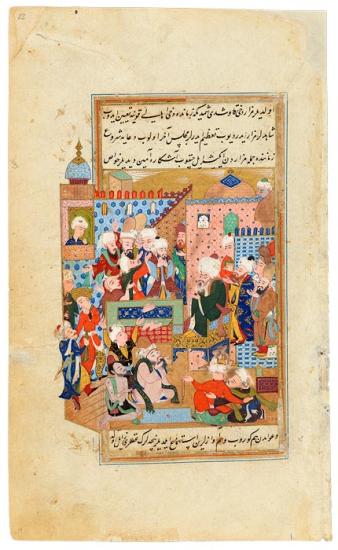
Rūmī's Father Gives a Sermon in the Qāni˓ī Cemetery of Konya
Tarjuma-i Thawāqib-i manāqib (A Translation of Stars of the Legend), in Turkish
The translation was ordered in 1590 by Sultan Murād III (r. 1574–95) from the Persian abridgement of Aflākī.
Purchased by Pierpont Morgan, 1911
Rūmī's father, Bahā˒ al-Dīn (d. 1231), a revered scholar and a man of great sanctity, reportedly worked many miracles in Konya. Seljuk Sultan ˓Āla˒ al-Dīn Kaiqubād I (r. 1219–1237) once ordered him to give a sermon in Konya's cemetery that proved to be so moving that the dead came out of their graves. At another point, shown here, pairs of hands emerge from the graves, their owners proclaiming, "Amen." The incident is not included in the original Persian text; it was added by the Turkish translator. Bahā˒ al-Dīn, dressed in green, sits on a tall gold chair; in the front is a dark-skinned dervish with burn marks (showing ardor for the beloved) and two men, seen from the back, embracing. Some figures wear the distinctive tall, honey-colored, felt hats of the Mevlevī order.
This miniature is part of a sixteenth-century manuscript account of the life and miracles of the Persian poet and mystic known as Rūmī. It is a Turkish translation of an abridged version of the original fourteenth-century Persian account by the dervish known as Aflākī.
Rūmī, Persian Mystic And Poet
The sixteenth-century miniatures presented here concern the life and miracles of Jalāl al-Dīn Rūmī, called Mē vlāna (Our Master), the most famous member of the Mevlevī order and Persia's greatest Sufi mystic and poet. He was born in Balkh in 1207, but his family emigrated after his father foresaw the Mongol conquest. They eventually resettled in Konya, Turkey, then the capital of Anatolian Rūm (thus Rūmī), where the poet died on 17 December 1273.
Several Persian accounts of Rūmī's life have been written, the first by his son, Sultan Walad. The third, laden with moralizing miracle stories, was ordered by Rūmī's grandson Ulu ˓Ārif Chelebi. It was written by the dervish Shams al-Dīn Aḥmad, called Aflākī (d. 1360). Aflākī also incorporated verses from Rūmī's works, notably his six-volume Masnavī (a poetical form of rhyming couplets) and the Dīvān-i-Shams al-Dīn Tabrīzī, named after Shams of Tabriz, the mystic who changed Rūmī's life and transformed him into a poet when they met in 1244.
In 1590—three and a half centuries after Aflākī wrote his life of Rūmī—the Ottoman sultan Mūrad III ordered a Turkish translation of a 1540 abridged version of Aflākī's text entitled Tarjuma-i Thawāqib-i manāqib (Stars of the Legend). The translator was Darvīsh Mahmud Mesnevī Khān of Konya. Two illustrated copies of the Murād translation, both made in Baghdad, survive. One, dated 1599, is held by Topkapi Palace, Istanbul, and has twenty-two miniatures. The other, richer manuscript is held by the Morgan. It dates to the 1590s and includes twenty-nine miniatures. They are all featured here, along with two folios from other collections that are believed to have once been part of the Morgan manuscript.
Seljuk Sultan's Courtier
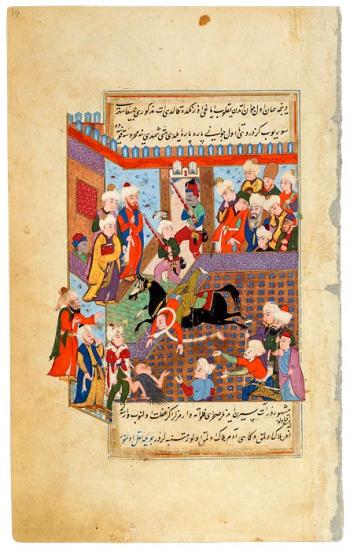
The Seljuk Sultan's Courtier Disturbs Rūmī's Visit to his Father's Grave
Tarjuma-i Thawāqib-i manāqib (A Translation of Stars of the Legend), in Turkish
The translation was ordered in 1590 by Sultan Murād III (r. 1574–95) from the Persian abridgement of Aflākī.
Purchased by Pierpont Morgan, 1911
While meditating near his father's tomb, Rūmī is disturbed when the sultan's courtier, Valad-i Fakhr al-Dīn Shādid, in princely attire, rides his black horse through the cemetery. Rūmī strongly reproves the rider, who then loses control of his horse, falls to the ground, and is injured. Rūmī, with a gray beard, is at the upper right, surrounded by students. Two men with guns guard the entrance to the walled city in the background. The cemetery itself is located outside the city walls, as was the custom.
This miniature is part of a sixteenth-century manuscript account of the life and miracles of the Persian poet and mystic known as Rūmī. It is a Turkish translation of an abridged version of the original fourteenth-century Persian account by the dervish known as Aflākī.
Rūmī, Persian Mystic And Poet
The sixteenth-century miniatures presented here concern the life and miracles of Jalāl al-Dīn Rūmī, called Mē vlāna (Our Master), the most famous member of the Mevlevī order and Persia's greatest Sufi mystic and poet. He was born in Balkh in 1207, but his family emigrated after his father foresaw the Mongol conquest. They eventually resettled in Konya, Turkey, then the capital of Anatolian Rūm (thus Rūmī), where the poet died on 17 December 1273.
Several Persian accounts of Rūmī's life have been written, the first by his son, Sultan Walad. The third, laden with moralizing miracle stories, was ordered by Rūmī's grandson Ulu ˓Ārif Chelebi. It was written by the dervish Shams al-Dīn Aḥmad, called Aflākī (d. 1360). Aflākī also incorporated verses from Rūmī's works, notably his six-volume Masnavī (a poetical form of rhyming couplets) and the Dīvān-i-Shams al-Dīn Tabrīzī, named after Shams of Tabriz, the mystic who changed Rūmī's life and transformed him into a poet when they met in 1244.
In 1590—three and a half centuries after Aflākī wrote his life of Rūmī—the Ottoman sultan Mūrad III ordered a Turkish translation of a 1540 abridged version of Aflākī's text entitled Tarjuma-i Thawāqib-i manāqib (Stars of the Legend). The translator was Darvīsh Mahmud Mesnevī Khān of Konya. Two illustrated copies of the Murād translation, both made in Baghdad, survive. One, dated 1599, is held by Topkapi Palace, Istanbul, and has twenty-two miniatures. The other, richer manuscript is held by the Morgan. It dates to the 1590s and includes twenty-nine miniatures. They are all featured here, along with two folios from other collections that are believed to have once been part of the Morgan manuscript.
Sermon by Rūmī
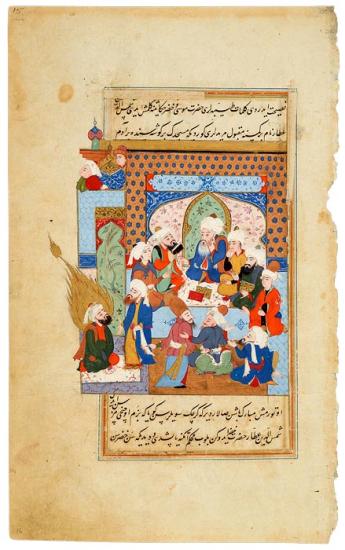
Khiżr Attends a Sermon by Rūmī
Tarjuma-i Thawāqib-i manāqib (A Translation of Stars of the Legend), in Turkish
The translation was ordered in 1590 by Sultan Murād III (r. 1574–95) from the Persian abridgement of Aflākī.
Purchased by Pierpont Morgan, 1911
According to the accompanying text, Rūmī, seated in the center, is explaining the stories of the prophets Khiżr and Mūsā (Moses) to his followers. Shams al-Din, a druggist, notices that Khiżr, dressed in his traditional green and adorned with the flaming halo designating a prophet, is sitting near a door of the mosque. When the druggist grabs Khiżr's robe in order to make a request, Khiżr tells him that he, like the other prophets, should seek guidance from Rūmī. Thought to be a contemporary of Moses, Khiżr is especially dear to the Sufis, who regard him as the initiator of those who walk the mystical path.
This miniature is part of a sixteenth-century manuscript account of the life and miracles of the Persian poet and mystic known as Rūmī. It is a Turkish translation of an abridged version of the original fourteenth-century Persian account by the dervish known as Aflākī.
Rūmī, Persian Mystic And Poet
The sixteenth-century miniatures presented here concern the life and miracles of Jalāl al-Dīn Rūmī, called Mē vlāna (Our Master), the most famous member of the Mevlevī order and Persia's greatest Sufi mystic and poet. He was born in Balkh in 1207, but his family emigrated after his father foresaw the Mongol conquest. They eventually resettled in Konya, Turkey, then the capital of Anatolian Rūm (thus Rūmī), where the poet died on 17 December 1273.
Several Persian accounts of Rūmī's life have been written, the first by his son, Sultan Walad. The third, laden with moralizing miracle stories, was ordered by Rūmī's grandson Ulu ˓Ārif Chelebi. It was written by the dervish Shams al-Dīn Aḥmad, called Aflākī (d. 1360). Aflākī also incorporated verses from Rūmī's works, notably his six-volume Masnavī (a poetical form of rhyming couplets) and the Dīvān-i-Shams al-Dīn Tabrīzī, named after Shams of Tabriz, the mystic who changed Rūmī's life and transformed him into a poet when they met in 1244.
In 1590—three and a half centuries after Aflākī wrote his life of Rūmī—the Ottoman sultan Mūrad III ordered a Turkish translation of a 1540 abridged version of Aflākī's text entitled Tarjuma-i Thawāqib-i manāqib (Stars of the Legend). The translator was Darvīsh Mahmud Mesnevī Khān of Konya. Two illustrated copies of the Murād translation, both made in Baghdad, survive. One, dated 1599, is held by Topkapi Palace, Istanbul, and has twenty-two miniatures. The other, richer manuscript is held by the Morgan. It dates to the 1590s and includes twenty-nine miniatures. They are all featured here, along with two folios from other collections that are believed to have once been part of the Morgan manuscript.
Three Saints
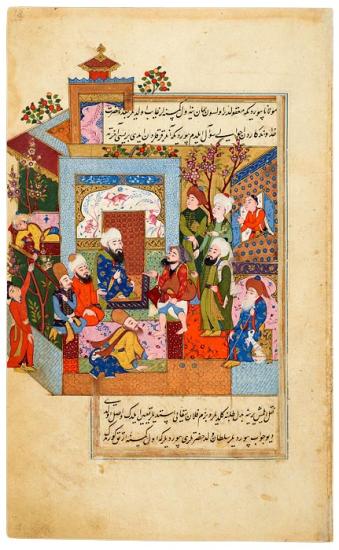
Three Saints Ask Rūmī for Permission to Take the Water Carrier of the Mevlevī Order with Them
Tarjuma-i Thawāqib-i manāqib (A Translation of Stars of the Legend), in Turkish
The translation was ordered in 1590 by Sultan Murād III (r. 1574–95) from the Persian abridgement of Aflākī.
Purchased by Pierpont Morgan, 1911
According to the story, not found in Aflākī's original Persian text but added by the Turkish translator, a delegation of three saints, all dressed in green, have come to visit Rūmī. They represent the forty saints that live in every generation, who, when one dies, choose a substitute. Here they ask Rūmī if they can take the water carrier of the Mevlevī order with them. The three saints stand behind the water carrier, who holds the large bag made of animal skin. Some genre scenes, as the doorkeeper at the right, and a youth offering an apple to a second youth on a balcony are not called for by the accompanying text, but are the kind of pictorial enrichments typical of the Baghdad school.
This miniature is part of a sixteenth-century manuscript account of the life and miracles of the Persian poet and mystic known as Rūmī. It is a Turkish translation of an abridged version of the original fourteenth-century Persian account by the dervish known as Aflākī.
Rūmī, Persian Mystic And Poet
The sixteenth-century miniatures presented here concern the life and miracles of Jalāl al-Dīn Rūmī, called Mē vlāna (Our Master), the most famous member of the Mevlevī order and Persia's greatest Sufi mystic and poet. He was born in Balkh in 1207, but his family emigrated after his father foresaw the Mongol conquest. They eventually resettled in Konya, Turkey, then the capital of Anatolian Rūm (thus Rūmī), where the poet died on 17 December 1273.
Several Persian accounts of Rūmī's life have been written, the first by his son, Sultan Walad. The third, laden with moralizing miracle stories, was ordered by Rūmī's grandson Ulu ˓Ārif Chelebi. It was written by the dervish Shams al-Dīn Aḥmad, called Aflākī (d. 1360). Aflākī also incorporated verses from Rūmī's works, notably his six-volume Masnavī (a poetical form of rhyming couplets) and the Dīvān-i-Shams al-Dīn Tabrīzī, named after Shams of Tabriz, the mystic who changed Rūmī's life and transformed him into a poet when they met in 1244.
In 1590—three and a half centuries after Aflākī wrote his life of Rūmī—the Ottoman sultan Mūrad III ordered a Turkish translation of a 1540 abridged version of Aflākī's text entitled Tarjuma-i Thawāqib-i manāqib (Stars of the Legend). The translator was Darvīsh Mahmud Mesnevī Khān of Konya. Two illustrated copies of the Murād translation, both made in Baghdad, survive. One, dated 1599, is held by Topkapi Palace, Istanbul, and has twenty-two miniatures. The other, richer manuscript is held by the Morgan. It dates to the 1590s and includes twenty-nine miniatures. They are all featured here, along with two folios from other collections that are believed to have once been part of the Morgan manuscript.
RūMī Stops His Ears
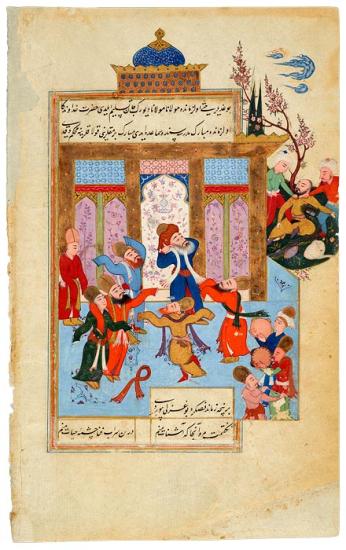
Participating in Samā˓, RūMī Stops His Ears Against the Cries of the Seljuq Sultan Rukn Al-Dīn Qlich
Tarjuma-i Thawāqib-i manāqib (A Translation of Stars of the Legend), in Turkish
The translation was ordered in 1590 by Sultan Murād III (r. 1574–95) from the Persian abridgement of Aflākī.
Purchased by Pierpont Morgan, 1911
According to the accompanying text, the Seljuq sultan Rukn al-Dīn Qilich Arslan IV (r. 1248–65) chose a questionable spiritual guide over Rūmī. Some days later he is strangled by some of his emirs. At the moment of the murder, Rūmī, participating in a mystical dance ceremony (samā˓), places his forefingers in his ears, leading a prayer for the dead. Rūmī later explained that the sultan had pleaded for his help, but he did not want to hear him, saying that a man's fate could not be changed. While the dervishes dance to the music of the flute and the tambourines, the noose is tightened around the sultan's neck.
This miniature is part of a sixteenth-century manuscript account of the life and miracles of the Persian poet and mystic known as Rūmī. It is a Turkish translation of an abridged version of the original fourteenth-century Persian account by the dervish known as Aflākī.
Rūmī, Persian Mystic And Poet
The sixteenth-century miniatures presented here concern the life and miracles of Jalāl al-Dīn Rūmī, called Mē vlāna (Our Master), the most famous member of the Mevlevī order and Persia's greatest Sufi mystic and poet. He was born in Balkh in 1207, but his family emigrated after his father foresaw the Mongol conquest. They eventually resettled in Konya, Turkey, then the capital of Anatolian Rūm (thus Rūmī), where the poet died on 17 December 1273.
Several Persian accounts of Rūmī's life have been written, the first by his son, Sultan Walad. The third, laden with moralizing miracle stories, was ordered by Rūmī's grandson Ulu ˓Ārif Chelebi. It was written by the dervish Shams al-Dīn Aḥmad, called Aflākī (d. 1360). Aflākī also incorporated verses from Rūmī's works, notably his six-volume Masnavī (a poetical form of rhyming couplets) and the Dīvān-i-Shams al-Dīn Tabrīzī, named after Shams of Tabriz, the mystic who changed Rūmī's life and transformed him into a poet when they met in 1244.
In 1590—three and a half centuries after Aflākī wrote his life of Rūmī—the Ottoman sultan Mūrad III ordered a Turkish translation of a 1540 abridged version of Aflākī's text entitled Tarjuma-i Thawāqib-i manāqib (Stars of the Legend). The translator was Darvīsh Mahmud Mesnevī Khān of Konya. Two illustrated copies of the Murād translation, both made in Baghdad, survive. One, dated 1599, is held by Topkapi Palace, Istanbul, and has twenty-two miniatures. The other, richer manuscript is held by the Morgan. It dates to the 1590s and includes twenty-nine miniatures. They are all featured here, along with two folios from other collections that are believed to have once been part of the Morgan manuscript.
Rūmī Summons Ḥamza
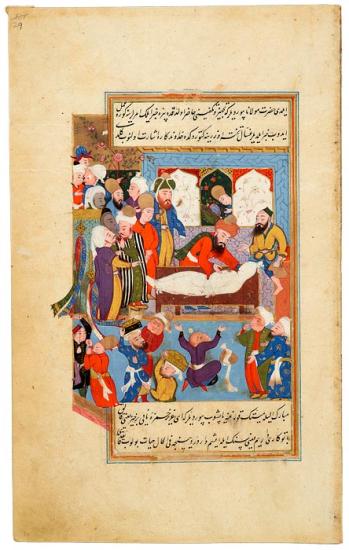
Rūmī Summons Ḥamza, the Famous Flute Player, Back to Life
Tarjuma-i Thawāqib-i manāqib (A Translation of Stars of the Legend), in Turkish
The translation was ordered in 1590 by Sultan Murād III (r. 1574–95) from the Persian abridgement of Aflākī.
Purchased by Pierpont Morgan, 1911
Ḥamza, the best flutist of the order, has just died. Rūmī raises the head of his corpse and miraculously restores him to life, saying, "My dear friend Ḥamza, arise!" Ḥamza then replies, "Lo, here I am!" takes up his flute, and sustains a religious festival for three days and nights. About one hundred Greeks witness the event and are converted to Islam. When Rūmī leaves, life departs from Ḥamza as well. In the left foreground, two youths hold religious standards, two men carry Qur˒an chests on their heads, and a dervish's felt hat and scarf have toppled to the ground.
This miniature is part of a sixteenth-century manuscript account of the life and miracles of the Persian poet and mystic known as Rūmī. It is a Turkish translation of an abridged version of the original fourteenth-century Persian account by the dervish known as Aflākī.
Rūmī, Persian Mystic And Poet
The sixteenth-century miniatures presented here concern the life and miracles of Jalāl al-Dīn Rūmī, called Mē vlāna (Our Master), the most famous member of the Mevlevī order and Persia's greatest Sufi mystic and poet. He was born in Balkh in 1207, but his family emigrated after his father foresaw the Mongol conquest. They eventually resettled in Konya, Turkey, then the capital of Anatolian Rūm (thus Rūmī), where the poet died on 17 December 1273.
Several Persian accounts of Rūmī's life have been written, the first by his son, Sultan Walad. The third, laden with moralizing miracle stories, was ordered by Rūmī's grandson Ulu ˓Ārif Chelebi. It was written by the dervish Shams al-Dīn Aḥmad, called Aflākī (d. 1360). Aflākī also incorporated verses from Rūmī's works, notably his six-volume Masnavī (a poetical form of rhyming couplets) and the Dīvān-i-Shams al-Dīn Tabrīzī, named after Shams of Tabriz, the mystic who changed Rūmī's life and transformed him into a poet when they met in 1244.
In 1590—three and a half centuries after Aflākī wrote his life of Rūmī—the Ottoman sultan Mūrad III ordered a Turkish translation of a 1540 abridged version of Aflākī's text entitled Tarjuma-i Thawāqib-i manāqib (Stars of the Legend). The translator was Darvīsh Mahmud Mesnevī Khān of Konya. Two illustrated copies of the Murād translation, both made in Baghdad, survive. One, dated 1599, is held by Topkapi Palace, Istanbul, and has twenty-two miniatures. The other, richer manuscript is held by the Morgan. It dates to the 1590s and includes twenty-nine miniatures. They are all featured here, along with two folios from other collections that are believed to have once been part of the Morgan manuscript.
ḤalĀwiyya Madrasa
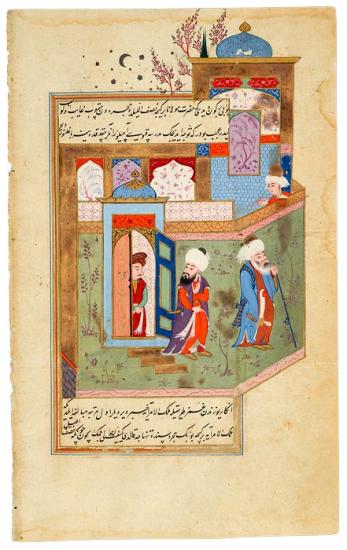
Rūmī Leaves the ḤalĀwiyya Madrasa at Aleppo at Midnight Followed by his Teac;her KamĀl Al-Din Ibn Cadīm, Ruler of Aleppo
Tarjuma-i Thawāqib-i manāqib (A Translation of Stars of the Legend), in Turkish
The translation was ordered in 1590 by Sultan Murād II (r. 1574–95) from the Persian abridgement of Aflākī.
Purchased by Pierpont Morgan, 1911
According to the accompanying text, some were jealous of the privilege Rūmī enjoyed at the school, complaining to the ruler of Aleppo that he often left his cell at midnight for some unknown, possibly immoral, purpose. One night, after the gates miraculously open, as shown here, the teacher decides to follow Rūmī, urging the gatekeeper not to alert him. He tracked him to the Khalīl al-Raḥman (Abraham) Mosque in Hebron, 350 miles away, where he saw Rūmī greeted by angels in green raiment. According to Aflākī (the author of the text from which this translation derives), it was the site of the tomb of Abraham, the spot where Nimrod threw Abraham into the fire. The teacher became disoriented, was discovered near death, recovered, and became a disciple of Rūmī.
This miniature is part of a sixteenth-century manuscript account of the life and miracles of the Persian poet and mystic known as Rūmī. It is a Turkish translation of an abridged version of the original fourteenth-century Persian account by the dervish known as Aflākī.
Rūmī, Persian Mystic And Poet
The sixteenth-century miniatures presented here concern the life and miracles of Jalāl al-Dīn Rūmī, called Mē vlāna (Our Master), the most famous member of the Mevlevī order and Persia's greatest Sufi mystic and poet. He was born in Balkh in 1207, but his family emigrated after his father foresaw the Mongol conquest. They eventually resettled in Konya, Turkey, then the capital of Anatolian Rūm (thus Rūmī), where the poet died on 17 December 1273.
Several Persian accounts of Rūmī's life have been written, the first by his son, Sultan Walad. The third, laden with moralizing miracle stories, was ordered by Rūmī's grandson Ulu ˓Ārif Chelebi. It was written by the dervish Shams al-Dīn Aḥmad, called Aflākī (d. 1360). Aflākī also incorporated verses from Rūmī's works, notably his six-volume Masnavī (a poetical form of rhyming couplets) and the Dīvān-i-Shams al-Dīn Tabrīzī, named after Shams of Tabriz, the mystic who changed Rūmī's life and transformed him into a poet when they met in 1244.
In 1590—three and a half centuries after Aflākī wrote his life of Rūmī—the Ottoman sultan Mūrad III ordered a Turkish translation of a 1540 abridged version of Aflākī's text entitled Tarjuma-i Thawāqib-i manāqib (Stars of the Legend). The translator was Darvīsh Mahmud Mesnevī Khān of Konya. Two illustrated copies of the Murād translation, both made in Baghdad, survive. One, dated 1599, is held by Topkapi Palace, Istanbul, and has twenty-two miniatures. The other, richer manuscript is held by the Morgan. It dates to the 1590s and includes twenty-nine miniatures. They are all featured here, along with two folios from other collections that are believed to have once been part of the Morgan manuscript.
Religious Dispute Between Rūmī
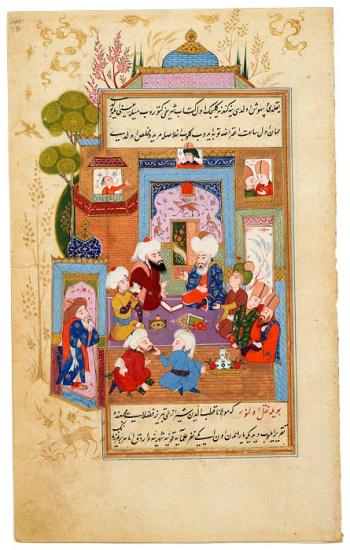
Religious Dispute Between Rūmī and the QaḌi SirĀj Al-Dīn Ormavī
Tarjuma-i Thawāqib-i manāqib (A Translation of Stars of the Legend), in Turkish
The translation was ordered in 1590 by Sultan Murād III (r. 1574–95) from the Persian abridgement of Aflākī.
Purchased by Pierpont Morgan, 1911
The discussion takes place in a Sufi madrasa, to judge by the old doorkeeper at the left, who wears the Mevlevī hat and leans on the traditional long staff. Rūmī, in a gold-patterned blue robe, faces the qaḍi (a judge of Islamic law), in a brown robe. The judge had rejected a certain fatwa (legal opinion) by Rūmī, but when the latter provided an exact textual reference, the judge fainted, later quoted it, and became a follower. In the foreground, a seated youth pulls the beard of the older man seated next to him.
This miniature is part of a sixteenth-century manuscript account of the life and miracles of the Persian poet and mystic known as Rūmī. It is a Turkish translation of an abridged version of the original fourteenth-century Persian account by the dervish known as Aflākī.
Rūmī, Persian Mystic And Poet
The sixteenth-century miniatures presented here concern the life and miracles of Jalāl al-Dīn Rūmī, called Mē vlāna (Our Master), the most famous member of the Mevlevī order and Persia's greatest Sufi mystic and poet. He was born in Balkh in 1207, but his family emigrated after his father foresaw the Mongol conquest. They eventually resettled in Konya, Turkey, then the capital of Anatolian Rūm (thus Rūmī), where the poet died on 17 December 1273.
Several Persian accounts of Rūmī's life have been written, the first by his son, Sultan Walad. The third, laden with moralizing miracle stories, was ordered by Rūmī's grandson Ulu ˓Ārif Chelebi. It was written by the dervish Shams al-Dīn Aḥmad, called Aflākī (d. 1360). Aflākī also incorporated verses from Rūmī's works, notably his six-volume Masnavī (a poetical form of rhyming couplets) and the Dīvān-i-Shams al-Dīn Tabrīzī, named after Shams of Tabriz, the mystic who changed Rūmī's life and transformed him into a poet when they met in 1244.
In 1590—three and a half centuries after Aflākī wrote his life of Rūmī—the Ottoman sultan Mūrad III ordered a Turkish translation of a 1540 abridged version of Aflākī's text entitled Tarjuma-i Thawāqib-i manāqib (Stars of the Legend). The translator was Darvīsh Mahmud Mesnevī Khān of Konya. Two illustrated copies of the Murād translation, both made in Baghdad, survive. One, dated 1599, is held by Topkapi Palace, Istanbul, and has twenty-two miniatures. The other, richer manuscript is held by the Morgan. It dates to the 1590s and includes twenty-nine miniatures. They are all featured here, along with two folios from other collections that are believed to have once been part of the Morgan manuscript.
A Young Merchant and Rūmī
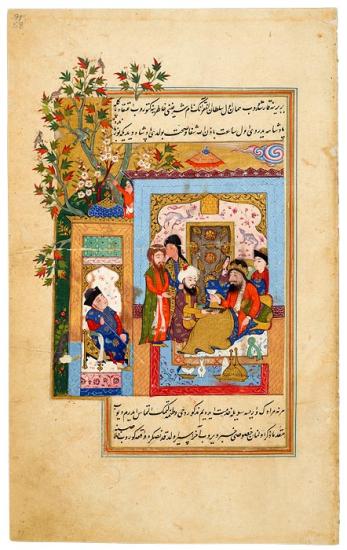
A Young Merchant and Rūmī Follower Cures the Gravely Ill Frankish King in Eqypt
Tarjuma-i Thawāqib-i manāqib (A Translation of Stars of the Legend), in Turkish
The translation was ordered in 1590 by Sultan Murād III (r. 1574–95) from the Persian abridgement of Aflākī.
Purchased by Pierpont Morgan, 1911
According to the story, the young merchant went to Egypt against the advice of Rūmī, where he was captured and imprisoned by the crusaders. Though a prisoner, he was able, with Rūmī's intercession, to heal the ailing leader of the Franks. Thereafter the merchant was freed and the entire Frankish household was converted to Islam. In the miniature the ailing Frank takes the cup offered by the physician. The king is surrounded by his household, including the woman peeking at the consultation from behind the curtained doorway. In the foreground are various containers and a conical loaf of sugar.
This miniature is part of a sixteenth-century manuscript account of the life and miracles of the Persian poet and mystic known as Rūmī. It is a Turkish translation of an abridged version of the original fourteenth-century Persian account by the dervish known as Aflākī.
Rūmī, Persian Mystic And Poet
The sixteenth-century miniatures presented here concern the life and miracles of Jalāl al-Dīn Rūmī, called Mē vlāna (Our Master), the most famous member of the Mevlevī order and Persia's greatest Sufi mystic and poet. He was born in Balkh in 1207, but his family emigrated after his father foresaw the Mongol conquest. They eventually resettled in Konya, Turkey, then the capital of Anatolian Rūm (thus Rūmī), where the poet died on 17 December 1273.
Several Persian accounts of Rūmī's life have been written, the first by his son, Sultan Walad. The third, laden with moralizing miracle stories, was ordered by Rūmī's grandson Ulu ˓Ārif Chelebi. It was written by the dervish Shams al-Dīn Aḥmad, called Aflākī (d. 1360). Aflākī also incorporated verses from Rūmī's works, notably his six-volume Masnavī (a poetical form of rhyming couplets) and the Dīvān-i-Shams al-Dīn Tabrīzī, named after Shams of Tabriz, the mystic who changed Rūmī's life and transformed him into a poet when they met in 1244.
In 1590—three and a half centuries after Aflākī wrote his life of Rūmī—the Ottoman sultan Mūrad III ordered a Turkish translation of a 1540 abridged version of Aflākī's text entitled Tarjuma-i Thawāqib-i manāqib (Stars of the Legend). The translator was Darvīsh Mahmud Mesnevī Khān of Konya. Two illustrated copies of the Murād translation, both made in Baghdad, survive. One, dated 1599, is held by Topkapi Palace, Istanbul, and has twenty-two miniatures. The other, richer manuscript is held by the Morgan. It dates to the 1590s and includes twenty-nine miniatures. They are all featured here, along with two folios from other collections that are believed to have once been part of the Morgan manuscript.
Water Monster
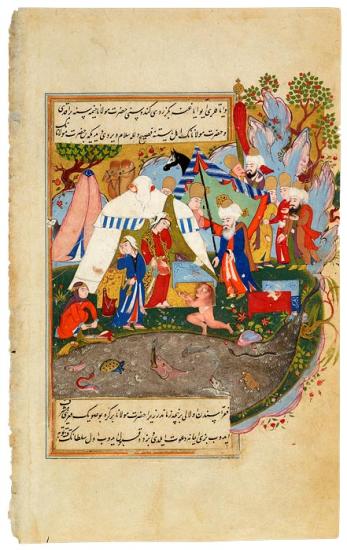
A Water Monster Begs Rūmī's Wife to Intercede for Him
Tarjuma-i Thawāqib-i manāqib (A Translation of Stars of the Legend), in Turkish
The translation was ordered in 1590 by Sultan Murād III (r. 1574–95) from the Persian abridgement of Aflākī.
Purchased by Pierpont Morgan, 1911
On their way to the bath of Ilghin, outside Konya, Rūmī and his party camp by a river inhabited by [S]u Essā, "the lord of the water." Every year the monster drowns a person or animal from the neighboring community. After Rūmī jumped in the river to meet him, [S]u Essā wanted to change his ways. Not considering it proper to present himself to Rūmī, he asked Kerā Khātūn, Rūmī's second wife, to intercede on his behalf. The strategy worked: Rūmī forgave the monster, who then brought precious pearls to his wife.
Here Rūmī's wife, regarded as a second Virgin Mary on account of her purity, modestly hides her face as her husband approaches. The lake is teeming with life; the artist indicated the far side of the lake by drawing the landscape upside down.
Rūmī, Persian Mystic And Poet
The sixteenth-century miniatures presented here concern the life and miracles of Jalāl al-Dīn Rūmī, called Mē vlāna (Our Master), the most famous member of the Mevlevī order and Persia's greatest Sufi mystic and poet. He was born in Balkh in 1207, but his family emigrated after his father foresaw the Mongol conquest. They eventually resettled in Konya, Turkey, then the capital of Anatolian Rūm (thus Rūmī), where the poet died on 17 December 1273.
Several Persian accounts of Rūmī's life have been written, the first by his son, Sultan Walad. The third, laden with moralizing miracle stories, was ordered by Rūmī's grandson Ulu ˓Ārif Chelebi. It was written by the dervish Shams al-Dīn Aḥmad, called Aflākī (d. 1360). Aflākī also incorporated verses from Rūmī's works, notably his six-volume Masnavī (a poetical form of rhyming couplets) and the Dīvān-i-Shams al-Dīn Tabrīzī, named after Shams of Tabriz, the mystic who changed Rūmī's life and transformed him into a poet when they met in 1244.
In 1590—three and a half centuries after Aflākī wrote his life of Rūmī—the Ottoman sultan Mūrad III ordered a Turkish translation of a 1540 abridged version of Aflākī's text entitled Tarjuma-i Thawāqib-i manāqib (Stars of the Legend). The translator was Darvīsh Mahmud Mesnevī Khān of Konya. Two illustrated copies of the Murād translation, both made in Baghdad, survive. One, dated 1599, is held by Topkapi Palace, Istanbul, and has twenty-two miniatures. The other, richer manuscript is held by the Morgan. It dates to the 1590s and includes twenty-nine miniatures. They are all featured here, along with two folios from other collections that are believed to have once been part of the Morgan manuscript.
Dogs in a Market
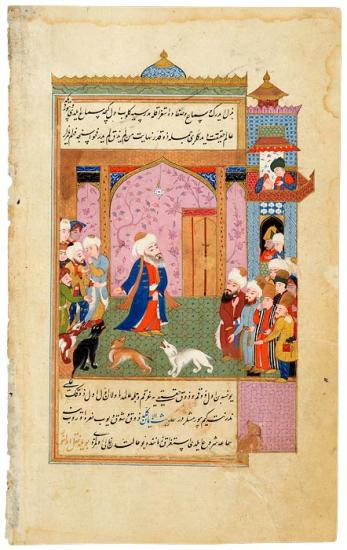
Dogs in a Market Listen to Rūmī, Who Praises their Understanding and Attention
Tarjuma-i Thawāqib-i manāqib (A Translation of Stars of the Legend), in Turkish
The translation was ordered in 1590 by Sultan Murād III (r. 1574–95) from the Persian abridgement of Aflākī.
Purchased by Pierpont Morgan, 1911
Several dogs in the foreground listen to a speech by Rūmī, who, pointing to the dogs, addresses a crowd in a courtyard. While dogs were generally not highly esteemed, Rūmī praises their understanding and attention, calling them "relatives of the dog of the Seven Sleepers" and reciting a distich (two-line verse) about love and paradise. Unlike the Christian story of the "Seven Sleepers of Ephesus," who were walled up in a cave, the version in the Qur˒an (sura 18: 9–6) includes a faithful dog that kept watch at the entrance while the youths slept. Seeking refuge from persecution by Decius, seven Christian youths hid in a cave, where they fell asleep. The emperor then sealed the cave. When it was opened several centuries later, the youths awoke, thinking only a night had passed.
This miniature is part of a sixteenth-century manuscript account of the life and miracles of the Persian poet and mystic known as Rūmī. It is a Turkish translation of an abridged version of the original fourteenth-century Persian account by the dervish known as Aflākī.
Rūmī, Persian Mystic And Poet
The sixteenth-century miniatures presented here concern the life and miracles of Jalāl al-Dīn Rūmī, called Mē vlāna (Our Master), the most famous member of the Mevlevī order and Persia's greatest Sufi mystic and poet. He was born in Balkh in 1207, but his family emigrated after his father foresaw the Mongol conquest. They eventually resettled in Konya, Turkey, then the capital of Anatolian Rūm (thus Rūmī), where the poet died on 17 December 1273.
Several Persian accounts of Rūmī's life have been written, the first by his son, Sultan Walad. The third, laden with moralizing miracle stories, was ordered by Rūmī's grandson Ulu ˓Ārif Chelebi. It was written by the dervish Shams al-Dīn Aḥmad, called Aflākī (d. 1360). Aflākī also incorporated verses from Rūmī's works, notably his six-volume Masnavī (a poetical form of rhyming couplets) and the Dīvān-i-Shams al-Dīn Tabrīzī, named after Shams of Tabriz, the mystic who changed Rūmī's life and transformed him into a poet when they met in 1244.
In 1590—three and a half centuries after Aflākī wrote his life of Rūmī—the Ottoman sultan Mūrad III ordered a Turkish translation of a 1540 abridged version of Aflākī's text entitled Tarjuma-i Thawāqib-i manāqib (Stars of the Legend). The translator was Darvīsh Mahmud Mesnevī Khān of Konya. Two illustrated copies of the Murād translation, both made in Baghdad, survive. One, dated 1599, is held by Topkapi Palace, Istanbul, and has twenty-two miniatures. The other, richer manuscript is held by the Morgan. It dates to the 1590s and includes twenty-nine miniatures. They are all featured here, along with two folios from other collections that are believed to have once been part of the Morgan manuscript.
Story of Seth
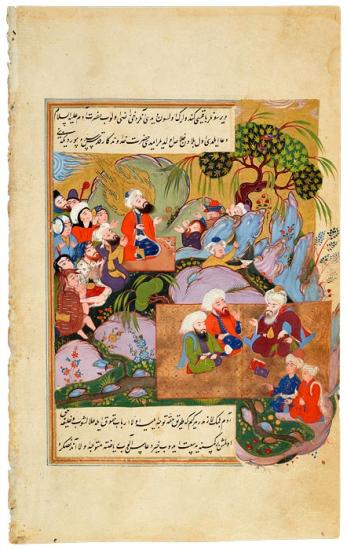
Rūmī Tells His Disciples the Story of Seth
Tarjuma-i Thawāqib-i manāqib (A Translation of Stars of the Legend), in Turkish
The translation was ordered in 1590 by Sultan Murād III (r. 1574–95) from the Persian abridgement of Aflākī.
Purchased by Pierpont Morgan, 1911
Seated on a tan mat, Rūmī tells his disciples about Seth, the spiritual heir of Adam who was regarded as a prophet. Seth's envious brothers, mocking him, were punished by God with drought and poverty, whereas Seth was taught weaving and sewing to earn a living. After the brothers realized their error, they sought forgiveness from Seth, who then prayed to God for rain. Here, Seth, with a flaming halo, sits at the upper left. A blue cloud emerges, saving the crops of the brothers, who may be the figures dressed in animals skins at the far left. A youth in the center collects water from a spring. For Rūmī, the moral is that all should follow the prophets and saints, and rulers should care for their subjects.
This miniature is part of a sixteenth-century manuscript account of the life and miracles of the Persian poet and mystic known as Rūmī. It is a Turkish translation of an abridged version of the original fourteenth-century Persian account by the dervish known as Aflākī.
Rūmī, Persian Mystic And Poet
The sixteenth-century miniatures presented here concern the life and miracles of Jalāl al-Dīn Rūmī, called Mē vlāna (Our Master), the most famous member of the Mevlevī order and Persia's greatest Sufi mystic and poet. He was born in Balkh in 1207, but his family emigrated after his father foresaw the Mongol conquest. They eventually resettled in Konya, Turkey, then the capital of Anatolian Rūm (thus Rūmī), where the poet died on 17 December 1273.
Several Persian accounts of Rūmī's life have been written, the first by his son, Sultan Walad. The third, laden with moralizing miracle stories, was ordered by Rūmī's grandson Ulu ˓Ārif Chelebi. It was written by the dervish Shams al-Dīn Aḥmad, called Aflākī (d. 1360). Aflākī also incorporated verses from Rūmī's works, notably his six-volume Masnavī (a poetical form of rhyming couplets) and the Dīvān-i-Shams al-Dīn Tabrīzī, named after Shams of Tabriz, the mystic who changed Rūmī's life and transformed him into a poet when they met in 1244.
In 1590—three and a half centuries after Aflākī wrote his life of Rūmī—the Ottoman sultan Mūrad III ordered a Turkish translation of a 1540 abridged version of Aflākī's text entitled Tarjuma-i Thawāqib-i manāqib (Stars of the Legend). The translator was Darvīsh Mahmud Mesnevī Khān of Konya. Two illustrated copies of the Murād translation, both made in Baghdad, survive. One, dated 1599, is held by Topkapi Palace, Istanbul, and has twenty-two miniatures. The other, richer manuscript is held by the Morgan. It dates to the 1590s and includes twenty-nine miniatures. They are all featured here, along with two folios from other collections that are believed to have once been part of the Morgan manuscript.
Construction of a Theological School

A Man Tells Rūmī About the Construction of a Theological School
Tarjuma-i Thawāqib-i manāqib (A Translation of Stars of the Legend), in Turkish
The translation was ordered in 1590 by Sultan Murād III (r. 1574–95) from the Persian abridgement of Aflākī.
Purchased by Pierpont Morgan, 1911
Rūmī, wearing the tall felt hat of his order, and a red bearded man are seated in the schoolroom of a madrasa (school). Behind them is a mihrab niche, found in the wall of mosques, which indicates the direction of prayer. In front of them, and in a smaller room on the left, students converse and study. On the minaret two men, their hands to their ears, give the call to prayer. The richly clad youth in the doorway may be the patron of the building, possibly the young Ḥasan Pasha, son of the Grand Vizier Soqollu Muḥammad Pasha and governor of Baghdad (r. 1598–1602), the patron of several Baghdad school manuscripts.
This miniature is part of a sixteenth-century manuscript account of the life and miracles of the Persian poet and mystic known as Rūmī. It is a Turkish translation of an abridged version of the original fourteenth-century Persian account by the dervish known as Aflākī.
Rūmī, Persian Mystic And Poet
The sixteenth-century miniatures presented here concern the life and miracles of Jalāl al-Dīn Rūmī, called Mē vlāna (Our Master), the most famous member of the Mevlevī order and Persia's greatest Sufi mystic and poet. He was born in Balkh in 1207, but his family emigrated after his father foresaw the Mongol conquest. They eventually resettled in Konya, Turkey, then the capital of Anatolian Rūm (thus Rūmī), where the poet died on 17 December 1273.
Several Persian accounts of Rūmī's life have been written, the first by his son, Sultan Walad. The third, laden with moralizing miracle stories, was ordered by Rūmī's grandson Ulu ˓Ārif Chelebi. It was written by the dervish Shams al-Dīn Aḥmad, called Aflākī (d. 1360). Aflākī also incorporated verses from Rūmī's works, notably his six-volume Masnavī (a poetical form of rhyming couplets) and the Dīvān-i-Shams al-Dīn Tabrīzī, named after Shams of Tabriz, the mystic who changed Rūmī's life and transformed him into a poet when they met in 1244.
In 1590—three and a half centuries after Aflākī wrote his life of Rūmī—the Ottoman sultan Mūrad III ordered a Turkish translation of a 1540 abridged version of Aflākī's text entitled Tarjuma-i Thawāqib-i manāqib (Stars of the Legend). The translator was Darvīsh Mahmud Mesnevī Khān of Konya. Two illustrated copies of the Murād translation, both made in Baghdad, survive. One, dated 1599, is held by Topkapi Palace, Istanbul, and has twenty-two miniatures. The other, richer manuscript is held by the Morgan. It dates to the 1590s and includes twenty-nine miniatures. They are all featured here, along with two folios from other collections that are believed to have once been part of the Morgan manuscript.
Mystical Scene
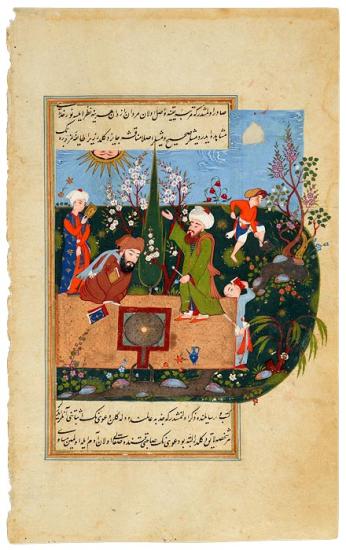
Mystical Scene with Shams Al-Dīn Tabrīzī and the Reflection of Sun in a Pool
Tarjuma-i Thawāqib-i manāqib (A Translation of Stars of the Legend), in Turkish
The translation was ordered in 1590 by Sultan Murād III (r. 1574–95) from the Persian abridgement of Aflākī.
Purchased by Pierpont Morgan, 1911
Shams of Tabriz was a wandering Sufi mystic and Rūmī's spiritual instructor. Their encounter and friendship provided a transforming experience that forever changed Rūmī's life. His disappearance led to Rūmī's Dīvān, written in his memory: The face of Shams al-Dīn, Tabriz's glory, is the sun, in whose track the cloud-like hearts are moving.
Shams means "Sun," and he was certainly Rūmī's sun. Here, Shams, in a brown cloak, sees the reflection of the sun in the center of a small pool, while Rūmī points to the upside-down face of the sun itself. For Shams, the pool is a symbol of paradise. The entwining cypress and blossoming fruit tree is a metaphor for the love between Rūmī and Shams.
This miniature is part of a sixteenth-century manuscript account of the life and miracles of the Persian poet and mystic known as Rūmī. It is a Turkish translation of an abridged version of the original fourteenth-century Persian account by the dervish known as Aflākī.
Rūmī, Persian Mystic And Poet
The sixteenth-century miniatures presented here concern the life and miracles of Jalāl al-Dīn Rūmī, called Mē vlāna (Our Master), the most famous member of the Mevlevī order and Persia's greatest Sufi mystic and poet. He was born in Balkh in 1207, but his family emigrated after his father foresaw the Mongol conquest. They eventually resettled in Konya, Turkey, then the capital of Anatolian Rūm (thus Rūmī), where the poet died on 17 December 1273.
Several Persian accounts of Rūmī's life have been written, the first by his son, Sultan Walad. The third, laden with moralizing miracle stories, was ordered by Rūmī's grandson Ulu ˓Ārif Chelebi. It was written by the dervish Shams al-Dīn Aḥmad, called Aflākī (d. 1360). Aflākī also incorporated verses from Rūmī's works, notably his six-volume Masnavī (a poetical form of rhyming couplets) and the Dīvān-i-Shams al-Dīn Tabrīzī, named after Shams of Tabriz, the mystic who changed Rūmī's life and transformed him into a poet when they met in 1244.
In 1590—three and a half centuries after Aflākī wrote his life of Rūmī—the Ottoman sultan Mūrad III ordered a Turkish translation of a 1540 abridged version of Aflākī's text entitled Tarjuma-i Thawāqib-i manāqib (Stars of the Legend). The translator was Darvīsh Mahmud Mesnevī Khān of Konya. Two illustrated copies of the Murād translation, both made in Baghdad, survive. One, dated 1599, is held by Topkapi Palace, Istanbul, and has twenty-two miniatures. The other, richer manuscript is held by the Morgan. It dates to the 1590s and includes twenty-nine miniatures. They are all featured here, along with two folios from other collections that are believed to have once been part of the Morgan manuscript.
Day in the Hot Baths
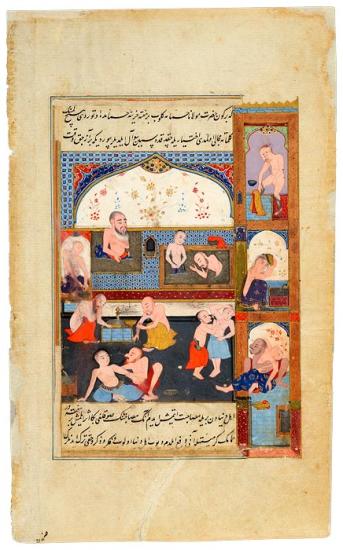
Rūmī Spends a Day in the Hot Baths of a Ḥammam
Tarjuma-i Thawāqib-i manāqib (A Translation of Stars of the Legend), in Turkish
The translation was ordered in 1590 by Sultan Murād III (r. 1574–95) from the Persian abridgement of Aflākī.
Purchased by Pierpont Morgan, 1911
Bathing was a traditional pastime for Sufis, and for Rūmī, in various stories and poems, the bath served as a metaphor for spiritual purification. Many scenes, therefore, were set within bathhouses. Here Rūmī sits by himself in one of the two pools set within the arched recess to cure a cold caused by "contact with the vain people." Elsewhere, and with a certain amount of humor, various bathhouse activities are depicted.
This miniature is part of a sixteenth-century manuscript account of the life and miracles of the Persian poet and mystic known as Rūmī. It is a Turkish translation of an abridged version of the original fourteenth-century Persian account by the dervish known as Aflākī.
Rūmī, Persian Mystic And Poet
The sixteenth-century miniatures presented here concern the life and miracles of Jalāl al-Dīn Rūmī, called Mē vlāna (Our Master), the most famous member of the Mevlevī order and Persia's greatest Sufi mystic and poet. He was born in Balkh in 1207, but his family emigrated after his father foresaw the Mongol conquest. They eventually resettled in Konya, Turkey, then the capital of Anatolian Rūm (thus Rūmī), where the poet died on 17 December 1273.
Several Persian accounts of Rūmī's life have been written, the first by his son, Sultan Walad. The third, laden with moralizing miracle stories, was ordered by Rūmī's grandson Ulu ˓Ārif Chelebi. It was written by the dervish Shams al-Dīn Aḥmad, called Aflākī (d. 1360). Aflākī also incorporated verses from Rūmī's works, notably his six-volume Masnavī (a poetical form of rhyming couplets) and the Dīvān-i-Shams al-Dīn Tabrīzī, named after Shams of Tabriz, the mystic who changed Rūmī's life and transformed him into a poet when they met in 1244.
In 1590—three and a half centuries after Aflākī wrote his life of Rūmī—the Ottoman sultan Mūrad III ordered a Turkish translation of a 1540 abridged version of Aflākī's text entitled Tarjuma-i Thawāqib-i manāqib (Stars of the Legend). The translator was Darvīsh Mahmud Mesnevī Khān of Konya. Two illustrated copies of the Murād translation, both made in Baghdad, survive. One, dated 1599, is held by Topkapi Palace, Istanbul, and has twenty-two miniatures. The other, richer manuscript is held by the Morgan. It dates to the 1590s and includes twenty-nine miniatures. They are all featured here, along with two folios from other collections that are believed to have once been part of the Morgan manuscript.
Prophet Muḥammad Reveals to Calī
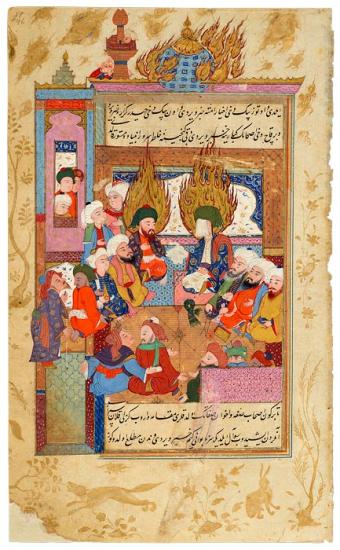
The Prophet Muḥammad Reveals to Calī Secrets Revealed to Him During the Miscrāj (Night Ride to Heaven)
Tarjuma-i Thawāqib-i manāqib (A Translation of Stars of the Legend), in Turkish
The translation was ordered in 1590 by Sultan Murād III (r. 1574–95) from the Persian abridgement of Aflākī.
Purchased by Pierpont Morgan, 1911
Muḥammad, his face veiled, reveals some of the secrets of creation to ˓Alī, his cousin and son-in-law. Both have halos of golden flames, and flames surround the dome of the mosque, signifying a holy event. Ten thousand of the hundred thousand secrets were revealed to ˓Alī alone. Having difficulty keeping them, he shouted them into a well, but a youth made a flute from the tree that grew from the reed in the well, and people came from all over to hear him play. Muḥammad requested to hear the youth perform, declaring that his notes "were the interpretation of the holy mysteries he had confided to ˓Alī." The flute was used ever since as part of the Mevlevī ritual dance (samā˓). Rūmī clearly borrowed the story of the barber who shouted the secret of King Midas's donkey ears into a hole over which reeds grew, the winds whispering the secret to all.
This miniature is part of a sixteenth-century manuscript account of the life and miracles of the Persian poet and mystic known as Rūmī. It is a Turkish translation of an abridged version of the original fourteenth-century Persian account by the dervish known as Aflākī.
Rūmī, Persian Mystic And Poet
The sixteenth-century miniatures presented here concern the life and miracles of Jalāl al-Dīn Rūmī, called Mē vlāna (Our Master), the most famous member of the Mevlevī order and Persia's greatest Sufi mystic and poet. He was born in Balkh in 1207, but his family emigrated after his father foresaw the Mongol conquest. They eventually resettled in Konya, Turkey, then the capital of Anatolian Rūm (thus Rūmī), where the poet died on 17 December 1273.
Several Persian accounts of Rūmī's life have been written, the first by his son, Sultan Walad. The third, laden with moralizing miracle stories, was ordered by Rūmī's grandson Ulu ˓Ārif Chelebi. It was written by the dervish Shams al-Dīn Aḥmad, called Aflākī (d. 1360). Aflākī also incorporated verses from Rūmī's works, notably his six-volume Masnavī (a poetical form of rhyming couplets) and the Dīvān-i-Shams al-Dīn Tabrīzī, named after Shams of Tabriz, the mystic who changed Rūmī's life and transformed him into a poet when they met in 1244.
In 1590—three and a half centuries after Aflākī wrote his life of Rūmī—the Ottoman sultan Mūrad III ordered a Turkish translation of a 1540 abridged version of Aflākī's text entitled Tarjuma-i Thawāqib-i manāqib (Stars of the Legend). The translator was Darvīsh Mahmud Mesnevī Khān of Konya. Two illustrated copies of the Murād translation, both made in Baghdad, survive. One, dated 1599, is held by Topkapi Palace, Istanbul, and has twenty-two miniatures. The other, richer manuscript is held by the Morgan. It dates to the 1590s and includes twenty-nine miniatures. They are all featured here, along with two folios from other collections that are believed to have once been part of the Morgan manuscript.
Execution of Husain Ibn Mansur Al-hallaj
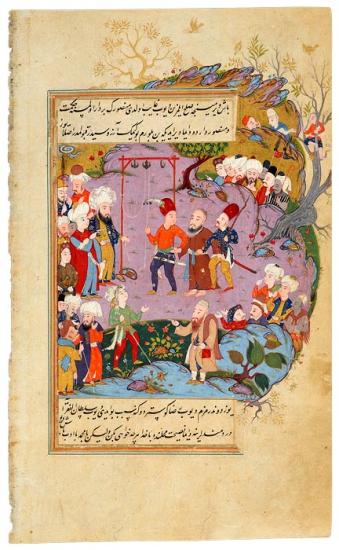
Execution of Ḥusain Ibn Manṣūr Al-ḥallāj Outside the Gates of Baghdad in 922
Tarjuma-i Thawāqib-i manāqib (A Translation of Stars of the Legend), in Turkish
The translation was ordered in 1590 by Sultan Murād III (r. 1574–95) from the Persian abridgement of Aflākī.
Purchased by Pierpont Morgan, 1911
Al-Ḥallāj (858–922), an early Sufi mystic, was condemned for heresy on account of the ecstatic utterances of "I am the Truth," or "I am God." The real reason had to do with political and religious rivalries among the Muslim orthodoxy and Sufis. The dervish in the foreground points to the group on the left, the ulama (religious, as opposed to spiritual, authorities), perhaps implicating them. Rūmī, however, said that al-Ḥallāj was executed because he questioned Muḥammad's judgment in not mediating for non-Muslins during his mi˓rāj (night ride to heaven). Al-Ḥallāj, in brown robes, is led to the gallows by two men wearing the tall red hats of executioners. In the text he asks for Muḥammad's pardon, who grants it in exchange for his head. Before the gallows Al-Ḥallāj said, "I know who asked for my head and I accept it." The Sufi spin, however, suggests that the gallows represent good tidings, promising the union that only death can achieve.
This miniature is part of a sixteenth-century manuscript account of the life and miracles of the Persian poet and mystic known as Rūmī. It is a Turkish translation of an abridged version of the original fourteenth-century Persian account by the dervish known as Aflākī.
Rūmī, Persian Mystic And Poet
The sixteenth-century miniatures presented here concern the life and miracles of Jalāl al-Dīn Rūmī, called Mē vlāna (Our Master), the most famous member of the Mevlevī order and Persia's greatest Sufi mystic and poet. He was born in Balkh in 1207, but his family emigrated after his father foresaw the Mongol conquest. They eventually resettled in Konya, Turkey, then the capital of Anatolian Rūm (thus Rūmī), where the poet died on 17 December 1273.
Several Persian accounts of Rūmī's life have been written, the first by his son, Sultan Walad. The third, laden with moralizing miracle stories, was ordered by Rūmī's grandson Ulu ˓Ārif Chelebi. It was written by the dervish Shams al-Dīn Aḥmad, called Aflākī (d. 1360). Aflākī also incorporated verses from Rūmī's works, notably his six-volume Masnavī (a poetical form of rhyming couplets) and the Dīvān-i-Shams al-Dīn Tabrīzī, named after Shams of Tabriz, the mystic who changed Rūmī's life and transformed him into a poet when they met in 1244.
In 1590—three and a half centuries after Aflākī wrote his life of Rūmī—the Ottoman sultan Mūrad III ordered a Turkish translation of a 1540 abridged version of Aflākī's text entitled Tarjuma-i Thawāqib-i manāqib (Stars of the Legend). The translator was Darvīsh Mahmud Mesnevī Khān of Konya. Two illustrated copies of the Murād translation, both made in Baghdad, survive. One, dated 1599, is held by Topkapi Palace, Istanbul, and has twenty-two miniatures. The other, richer manuscript is held by the Morgan. It dates to the 1590s and includes twenty-nine miniatures. They are all featured here, along with two folios from other collections that are believed to have once been part of the Morgan manuscript.
An Escaped Bull Seeks Refuge at Rumi's Feet
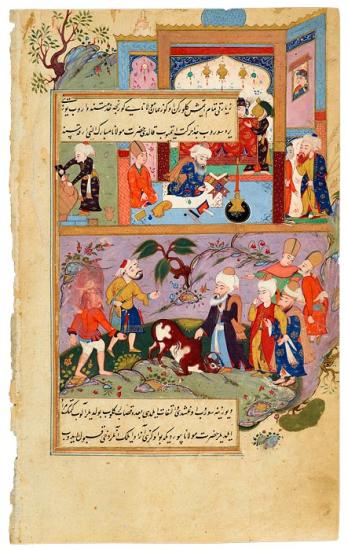
An Escaped Bull Seeks Refuge at Rūmī's Feet
arjuma-i Thawāqib-i manāqib (A Translation of Stars of the Legend), in Turkish
The translation was ordered in 1590 by Sultan Murād III (r. 1574–95) from the Persian abridgement of Aflākī.
Purchased by Pierpont Morgan, 1911
At the top, Rūmī, in the mausoleum of his father, Bahā˒ al-Dīn, reads from a Qur˒an on a wooden stand. The tomb itself is covered in red cloth. In the scene below, a butcher pursues an escaped bull that has sought refuge at the feet of Rūmī, who, along with four students, has just left his father's tomb. Since the bull asked for Rūmī's protection, he asked the butchers to set it free; they comply, and the bull was never seen again. The moral of the story is that those who follow and take refuge with men of God will escape the butchers or demons of hell.
This miniature is part of a sixteenth-century manuscript account of the life and miracles of the Persian poet and mystic known as Rūmī. It is a Turkish translation of an abridged version of the original fourteenth-century Persian account by the dervish known as Aflākī.
Rūmī, Persian Mystic And Poet
The sixteenth-century miniatures presented here concern the life and miracles of Jalāl al-Dīn Rūmī, called Mē vlāna (Our Master), the most famous member of the Mevlevī order and Persia's greatest Sufi mystic and poet. He was born in Balkh in 1207, but his family emigrated after his father foresaw the Mongol conquest. They eventually resettled in Konya, Turkey, then the capital of Anatolian Rūm (thus Rūmī), where the poet died on 17 December 1273.
Several Persian accounts of Rūmī's life have been written, the first by his son, Sultan Walad. The third, laden with moralizing miracle stories, was ordered by Rūmī's grandson Ulu ˓Ārif Chelebi. It was written by the dervish Shams al-Dīn Aḥmad, called Aflākī (d. 1360). Aflākī also incorporated verses from Rūmī's works, notably his six-volume Masnavī (a poetical form of rhyming couplets) and the Dīvān-i-Shams al-Dīn Tabrīzī, named after Shams of Tabriz, the mystic who changed Rūmī's life and transformed him into a poet when they met in 1244.
In 1590—three and a half centuries after Aflākī wrote his life of Rūmī—the Ottoman sultan Mūrad III ordered a Turkish translation of a 1540 abridged version of Aflākī's text entitled Tarjuma-i Thawāqib-i manāqib (Stars of the Legend). The translator was Darvīsh Mahmud Mesnevī Khān of Konya. Two illustrated copies of the Murād translation, both made in Baghdad, survive. One, dated 1599, is held by Topkapi Palace, Istanbul, and has twenty-two miniatures. The other, richer manuscript is held by the Morgan. It dates to the 1590s and includes twenty-nine miniatures. They are all featured here, along with two folios from other collections that are believed to have once been part of the Morgan manuscript.
How to Curb an Appetite
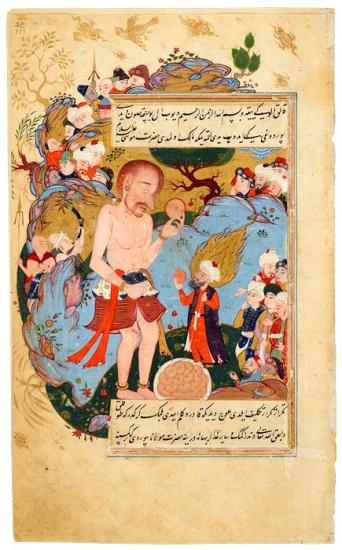
Mūsā (Moses) Tells the Giant Cüj Ibn Canāq How to Curb an Appetite
Tarjuma-i Thawāqib-i manāqib (A Translation of Stars of the Legend), in Turkish
The translation was ordered in 1590 by Sultan Murād III (r. 1574–95) from the Persian abridgement of Aflākī.
Purchased by Pierpont Morgan, 1911
Some highly unusual scenes are depicted in the manuscript, including an encounter between Mūsā and the giant ˓üj (King Og of the Old Testament), whose daily appetite for bread could not be satisfied, even by the output of seventy bakers. One day, upon seeing ˓üj unsatisfied after eating the bread, Mūsā proposes a way for him to be satisfied by only seven mouthfuls. He suggests that before eating, ˓üj should wash his hands and recite the bismillah (In the name of God, the Merciful, the Compassionate) and then take the bowl. But ˓üj is unable to consume even seven mouthfuls. Mūsā then says, "Know that satiety comes from God. Bread is just a pretext."
This miniature is part of a sixteenth-century manuscript account of the life and miracles of the Persian poet and mystic known as Rūmī. It is a Turkish translation of an abridged version of the original fourteenth-century Persian account by the dervish known as Aflākī.
Rūmī, Persian Mystic And Poet
The sixteenth-century miniatures presented here concern the life and miracles of Jalāl al-Dīn Rūmī, called Mē vlāna (Our Master), the most famous member of the Mevlevī order and Persia's greatest Sufi mystic and poet. He was born in Balkh in 1207, but his family emigrated after his father foresaw the Mongol conquest. They eventually resettled in Konya, Turkey, then the capital of Anatolian Rūm (thus Rūmī), where the poet died on 17 December 1273.
Several Persian accounts of Rūmī's life have been written, the first by his son, Sultan Walad. The third, laden with moralizing miracle stories, was ordered by Rūmī's grandson Ulu ˓Ārif Chelebi. It was written by the dervish Shams al-Dīn Aḥmad, called Aflākī (d. 1360). Aflākī also incorporated verses from Rūmī's works, notably his six-volume Masnavī (a poetical form of rhyming couplets) and the Dīvān-i-Shams al-Dīn Tabrīzī, named after Shams of Tabriz, the mystic who changed Rūmī's life and transformed him into a poet when they met in 1244.
In 1590—three and a half centuries after Aflākī wrote his life of Rūmī—the Ottoman sultan Mūrad III ordered a Turkish translation of a 1540 abridged version of Aflākī's text entitled Tarjuma-i Thawāqib-i manāqib (Stars of the Legend). The translator was Darvīsh Mahmud Mesnevī Khān of Konya. Two illustrated copies of the Murād translation, both made in Baghdad, survive. One, dated 1599, is held by Topkapi Palace, Istanbul, and has twenty-two miniatures. The other, richer manuscript is held by the Morgan. It dates to the 1590s and includes twenty-nine miniatures. They are all featured here, along with two folios from other collections that are believed to have once been part of the Morgan manuscript.
A Physician Bleeds a King
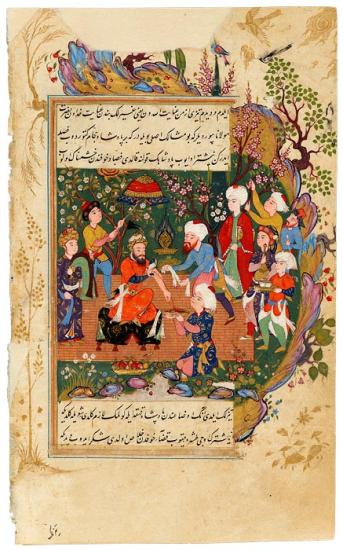
A Physician Bleeds a King
Tarjuma-i Thawāqib-i manāqib (A Translation of Stars of the Legend), in Turkish
The translation was ordered in 1590 by Sultan Murād III (r. 1574–95) from the Persian abridgement of Aflākī.
Purchased by Pierpont Morgan
Bloodletting is an old medical procedure that was once commonly practiced. (George Washington, suffering from acute laryngitis, was bled profusely before his death on 14 December 1799.) Here, in an outdoor garden setting, the court physician lets the blood of his king, which is collected in a golden basin held by a kneeling youth. In the background, between the king and the doctor, an incense burner emits black smoke. (Rūmī, on one occasion, to prove that man lives through God's will alone, and not by blood, had his blood completely drained, went to a hot bath, and performed the samā˓.
This miniature is part of a sixteenth-century manuscript account of the life and miracles of the Persian poet and mystic known as Rūmī. It is a Turkish translation of an abridged version of the original fourteenth-century Persian account by the dervish known as Aflākī.
Rūmī, Persian Mystic And Poet
The sixteenth-century miniatures presented here concern the life and miracles of Jalāl al-Dīn Rūmī, called Mē vlāna (Our Master), the most famous member of the Mevlevī order and Persia's greatest Sufi mystic and poet. He was born in Balkh in 1207, but his family emigrated after his father foresaw the Mongol conquest. They eventually resettled in Konya, Turkey, then the capital of Anatolian Rūm (thus Rūmī), where the poet died on 17 December 1273.
Several Persian accounts of Rūmī's life have been written, the first by his son, Sultan Walad. The third, laden with moralizing miracle stories, was ordered by Rūmī's grandson Ulu ˓Ārif Chelebi. It was written by the dervish Shams al-Dīn Aḥmad, called Aflākī (d. 1360). Aflākī also incorporated verses from Rūmī's works, notably his six-volume Masnavī (a poetical form of rhyming couplets) and the Dīvān-i-Shams al-Dīn Tabrīzī, named after Shams of Tabriz, the mystic who changed Rūmī's life and transformed him into a poet when they met in 1244.
In 1590—three and a half centuries after Aflākī wrote his life of Rūmī—the Ottoman sultan Mūrad III ordered a Turkish translation of a 1540 abridged version of Aflākī's text entitled Tarjuma-i Thawāqib-i manāqib (Stars of the Legend). The translator was Darvīsh Mahmud Mesnevī Khān of Konya. Two illustrated copies of the Murād translation, both made in Baghdad, survive. One, dated 1599, is held by Topkapi Palace, Istanbul, and has twenty-two miniatures. The other, richer manuscript is held by the Morgan. It dates to the 1590s and includes twenty-nine miniatures. They are all featured here, along with two folios from other collections that are believed to have once been part of the Morgan manuscript.
Rumi Meets with His Followers for the Last Time
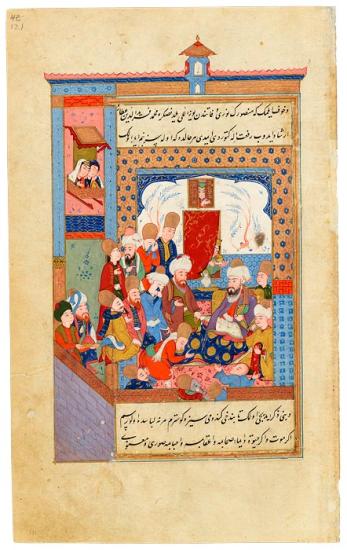
Rūmī Meets with His Followers for the Last Time
Tarjuma-i Thawāqib-i manāqib (A Translation of Stars of the Legend), in Turkish
The translation was ordered in 1590 by Sultan Murād III (r. 1574–95) from the Persian abridgement of Aflākī.
Purchased by Pierpont Morgan, 1911
From his deathbed, his legs covered with a quilt, Rūmī addresses his followers for the last time. Some of the disciples are visibly overcome with grief, while women watch from a distance—one, behind a curtain, about to bring food. He assures them that, as he has guided in life, after his death he will send blessings and will always belong to them, shedding the light of heavenly inspiration on them. "The best of mankind is he who benefits man," he says, and "the best of speech is that which is short and to the purpose." In addition to the followers, an extremely handsome young man appears. It was ˓Azra˒īl (Gabriel), the angel of death, who has been sent by the Exalted One. Rūmī welcomes him, saying, "Draw closer... and do what you have been ordered." On 17 December 1273, as the sun went down, Rūmī died.
This miniature is part of a sixteenth-century manuscript account of the life and miracles of the Persian poet and mystic known as Rūmī. It is a Turkish translation of an abridged version of the original fourteenth-century Persian account by the dervish known as Aflākī.
Rūmī, Persian Mystic And Poet
The sixteenth-century miniatures presented here concern the life and miracles of Jalāl al-Dīn Rūmī, called Mē vlāna (Our Master), the most famous member of the Mevlevī order and Persia's greatest Sufi mystic and poet. He was born in Balkh in 1207, but his family emigrated after his father foresaw the Mongol conquest. They eventually resettled in Konya, Turkey, then the capital of Anatolian Rūm (thus Rūmī), where the poet died on 17 December 1273.
Several Persian accounts of Rūmī's life have been written, the first by his son, Sultan Walad. The third, laden with moralizing miracle stories, was ordered by Rūmī's grandson Ulu ˓Ārif Chelebi. It was written by the dervish Shams al-Dīn Aḥmad, called Aflākī (d. 1360). Aflākī also incorporated verses from Rūmī's works, notably his six-volume Masnavī (a poetical form of rhyming couplets) and the Dīvān-i-Shams al-Dīn Tabrīzī, named after Shams of Tabriz, the mystic who changed Rūmī's life and transformed him into a poet when they met in 1244.
In 1590—three and a half centuries after Aflākī wrote his life of Rūmī—the Ottoman sultan Mūrad III ordered a Turkish translation of a 1540 abridged version of Aflākī's text entitled Tarjuma-i Thawāqib-i manāqib (Stars of the Legend). The translator was Darvīsh Mahmud Mesnevī Khān of Konya. Two illustrated copies of the Murād translation, both made in Baghdad, survive. One, dated 1599, is held by Topkapi Palace, Istanbul, and has twenty-two miniatures. The other, richer manuscript is held by the Morgan. It dates to the 1590s and includes twenty-nine miniatures. They are all featured here, along with two folios from other collections that are believed to have once been part of the Morgan manuscript.
The Funeral of Jalal Al-Din Rumi
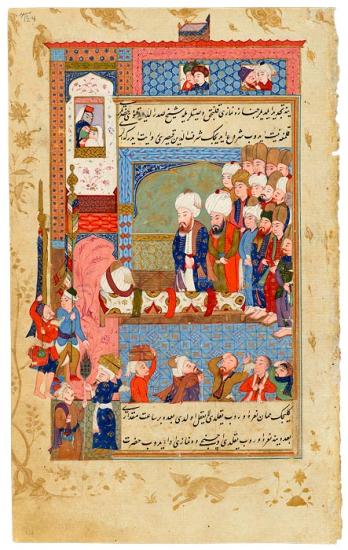
The Funeral of Jalāl Al-Dīn Rūmī
Tarjuma-i Thawāqib-i manāqib (A Translation of Stars of the Legend), in Turkish
The translation was ordered in 1590 by Sultan Murād III (r. 1574–95) from the Persian abridgement of Aflākī.
Purchased by Pierpont Morgan, 1911
Rūmī's body, in a white shroud patterned with red and gold medallions and tiny flowers, has been strapped to a bier for transport to the cemetery. His turban and Mevlevī hat are also on the bier. The procession is about to begin, complete with standard-bearers, a portable incense burner, and book boxes containing Qur˒ans. According to the accompanying text, Rūmī was so revered that the mourners were of all creeds and nations, including Jews and Christians, who explained that from him they had learned more about their own scriptures, finding in him the "signs of and qualities of a prophet and a saint."
This miniature is part of a sixteenth-century manuscript account of the life and miracles of the Persian poet and mystic known as Rūmī. It is a Turkish translation of an abridged version of the original fourteenth-century Persian account by the dervish known as Aflākī.
Rūmī, Persian Mystic And Poet
The sixteenth-century miniatures presented here concern the life and miracles of Jalāl al-Dīn Rūmī, called Mē vlāna (Our Master), the most famous member of the Mevlevī order and Persia's greatest Sufi mystic and poet. He was born in Balkh in 1207, but his family emigrated after his father foresaw the Mongol conquest. They eventually resettled in Konya, Turkey, then the capital of Anatolian Rūm (thus Rūmī), where the poet died on 17 December 1273.
Several Persian accounts of Rūmī's life have been written, the first by his son, Sultan Walad. The third, laden with moralizing miracle stories, was ordered by Rūmī's grandson Ulu ˓Ārif Chelebi. It was written by the dervish Shams al-Dīn Aḥmad, called Aflākī (d. 1360). Aflākī also incorporated verses from Rūmī's works, notably his six-volume Masnavī (a poetical form of rhyming couplets) and the Dīvān-i-Shams al-Dīn Tabrīzī, named after Shams of Tabriz, the mystic who changed Rūmī's life and transformed him into a poet when they met in 1244.
In 1590—three and a half centuries after Aflākī wrote his life of Rūmī—the Ottoman sultan Mūrad III ordered a Turkish translation of a 1540 abridged version of Aflākī's text entitled Tarjuma-i Thawāqib-i manāqib (Stars of the Legend). The translator was Darvīsh Mahmud Mesnevī Khān of Konya. Two illustrated copies of the Murād translation, both made in Baghdad, survive. One, dated 1599, is held by Topkapi Palace, Istanbul, and has twenty-two miniatures. The other, richer manuscript is held by the Morgan. It dates to the 1590s and includes twenty-nine miniatures. They are all featured here, along with two folios from other collections that are believed to have once been part of the Morgan manuscript.
Konya, Besieged
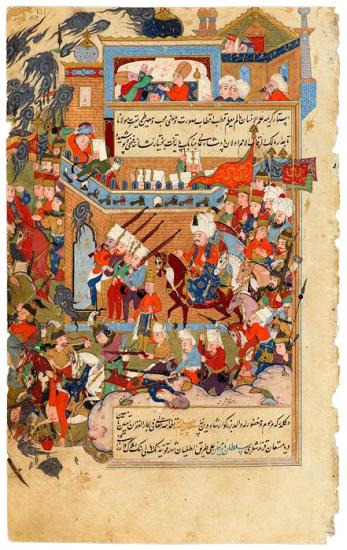
Konya, Besieged During a Fight for the Throne of Sultan Sūleyman's Two Sons, is Protected by Clouds of Salt
Tarjuma-i Thawāqib-i manāqib (A Translation of Stars of the Legend), in Turkish
The translation was ordered in 1590 by Sultan Murād III (r. 1574–95) from the Persian abridgement of Aflākī.
Purchased by Pierpont Morgan, 1911
This scene depicts a miracle that occurs during a 1559 battle between Princes Selim and Beyazid, the two sons of Sūleyman (r. 1520–66) who were vying for the throne. During the battle, the city of Konya is miraculously protected by clouds of salt that emanate from the green-domed tomb of Rūmī and rain down on Prince Beyazid's soldiers, causing them to flee. Here the victorious Selim rides on horseback, while members of the Mevlevī order offer prayers in a room at the top. Beyazid sought refuge with the Safavids, but in 1561 Selim paid to have him strangled, paving his own way to the throne (r. 1566–1574).
This miniature appears in a manuscript of a sixteenth-century Turkish translation of a fourteenth-century life of Rūmī. Since the siege depicted here took place in 1559—many years after the original text was written—this story must have been added by the translator Darvīsh Maḥmūd.
Rūmī, Persian Mystic And Poet
The sixteenth-century miniatures presented here concern the life and miracles of Jalāl al-Dīn Rūmī, called Mē vlāna (Our Master), the most famous member of the Mevlevī order and Persia's greatest Sufi mystic and poet. He was born in Balkh in 1207, but his family emigrated after his father foresaw the Mongol conquest. They eventually resettled in Konya, Turkey, then the capital of Anatolian Rūm (thus Rūmī), where the poet died on 17 December 1273.
Several Persian accounts of Rūmī's life have been written, the first by his son, Sultan Walad. The third, laden with moralizing miracle stories, was ordered by Rūmī's grandson Ulu ˓Ārif Chelebi. It was written by the dervish Shams al-Dīn Aḥmad, called Aflākī (d. 1360). Aflākī also incorporated verses from Rūmī's works, notably his six-volume Masnavī (a poetical form of rhyming couplets) and the Dīvān-i-Shams al-Dīn Tabrīzī, named after Shams of Tabriz, the mystic who changed Rūmī's life and transformed him into a poet when they met in 1244.
In 1590—three and a half centuries after Aflākī wrote his life of Rūmī—the Ottoman sultan Mūrad III ordered a Turkish translation of a 1540 abridged version of Aflākī's text entitled Tarjuma-i Thawāqib-i manāqib (Stars of the Legend). The translator was Darvīsh Mahmud Mesnevī Khān of Konya. Two illustrated copies of the Murād translation, both made in Baghdad, survive. One, dated 1599, is held by Topkapi Palace, Istanbul, and has twenty-two miniatures. The other, richer manuscript is held by the Morgan. It dates to the 1590s and includes twenty-nine miniatures. They are all featured here, along with two folios from other collections that are believed to have once been part of the Morgan manuscript.
Iblis (Satan) Leads Umar

Iblīs (Satan) Leads Umar, the Second Caliph, into a Mosque Containing One Man at Prayer, the Other Sleeping, Saying He Would Destroy the Man Who Prays Because He is in the Ecstasy of the love of God while the Sleeping Man is Only In Oblivion
Tarjuma-i Thawāqib-i manāqib (A Translation of Stars of the Legend), in Turkish
The translation was ordered in 1590 by Sultan Murād III (r. 1574–95) from the Persian abridgement of Aflākī.
Purchased by Pierpont Morgan, 1911
Iblīs (Satan), shown with gold flaming eyes, has taken ˓Umar to visit a mosque. ˓Umar (d. 644), called Fārūq (discriminator) because he could discriminate between right and wrong, was the second caliph (meaning "successor"/"follower") or leader of the Islamic community after the death of Muḥammad in 632. At the mosque they see a standing man, his hands folded, in deep prayer. Beneath the tall minbar (a raised pulpit from which the imam, or prayer leader, delivers his sermon) another man is asleep, his closed books to his side. Iblīs then explains that he would destroy the man that prays, for he is in the ecstasy of the love of God. For Rūmī, the story is an allegory of the power of love, for it is the love of God that will bring about the destruction of Iblīs.
This miniature is part of a sixteenth-century manuscript account of the life and miracles of the Persian poet and mystic known as Rūmī. It is a Turkish translation of an abridged version of the original fourteenth-century Persian account by the dervish known as Aflākī.
Rūmī, Persian Mystic And Poet
The sixteenth-century miniatures presented here concern the life and miracles of Jalāl al-Dīn Rūmī, called Mē vlāna (Our Master), the most famous member of the Mevlevī order and Persia's greatest Sufi mystic and poet. He was born in Balkh in 1207, but his family emigrated after his father foresaw the Mongol conquest. They eventually resettled in Konya, Turkey, then the capital of Anatolian Rūm (thus Rūmī), where the poet died on 17 December 1273.
Several Persian accounts of Rūmī's life have been written, the first by his son, Sultan Walad. The third, laden with moralizing miracle stories, was ordered by Rūmī's grandson Ulu ˓Ārif Chelebi. It was written by the dervish Shams al-Dīn Aḥmad, called Aflākī (d. 1360). Aflākī also incorporated verses from Rūmī's works, notably his six-volume Masnavī (a poetical form of rhyming couplets) and the Dīvān-i-Shams al-Dīn Tabrīzī, named after Shams of Tabriz, the mystic who changed Rūmī's life and transformed him into a poet when they met in 1244.
In 1590—three and a half centuries after Aflākī wrote his life of Rūmī—the Ottoman sultan Mūrad III ordered a Turkish translation of a 1540 abridged version of Aflākī's text entitled Tarjuma-i Thawāqib-i manāqib (Stars of the Legend). The translator was Darvīsh Mahmud Mesnevī Khān of Konya. Two illustrated copies of the Murād translation, both made in Baghdad, survive. One, dated 1599, is held by Topkapi Palace, Istanbul, and has twenty-two miniatures. The other, richer manuscript is held by the Morgan. It dates to the 1590s and includes twenty-nine miniatures. They are all featured here, along with two folios from other collections that are believed to have once been part of the Morgan manuscript.
Husam Al-Din Chelebi
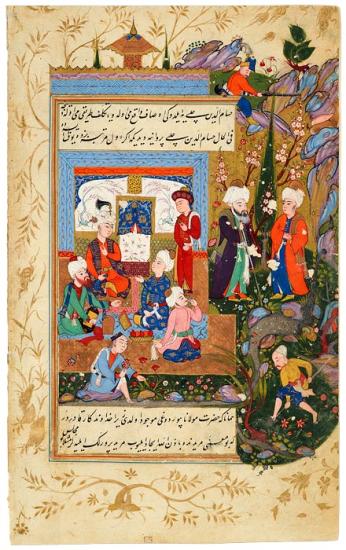
Ḥusām Al-Dīn Chelebi is Brought to a Reception Given for Rūmī by Mucīn Al-Dīn Parvāna, a Minister of Konya
Tarjuma-i Thawāqib-i manāqib (A Translation of Stars of the Legend), in Turkish
The translation was ordered in 1590 by Sultan Murād III (r. 1574–95) from the Persian abridgement of Aflākī.
Purchased by Pierpont Morgan, 1911
Rūmī and Ḥusām Chelebi (d. 1284) are shown in the garden at the right. Rūmī's deep love and yearning for his young disciple and designated successor is indicated by well-known metaphors: the entwined cypress and blossoming fruit tree, the young gardener below, and the youth picking flowers. In the text, Rūmī is described as a nightingale and Ḥusām as a rose. Within the palace the young minister, wearing a white turban with flowers and a black feather, awaits the arrival of Rūmī and his beloved. It was Ḥusām who asked Rūmī to compose a didactic poem for his disciples. Rūmī responded with the "Song of the Reed," the first eighteen verses of the Masnavī, his six-volume poetic work in rhyming couplets. Ḥusām assisted Rūmī by transcribing his 24,660 couplets.
This miniature is part of a sixteenth-century manuscript account of the life and miracles of the Persian poet and mystic known as Rūmī. It is a Turkish translation of an abridged version of the original fourteenth-century Persian account by the dervish known as Aflākī.
Rūmī, Persian Mystic And Poet
The sixteenth-century miniatures presented here concern the life and miracles of Jalāl al-Dīn Rūmī, called Mē vlāna (Our Master), the most famous member of the Mevlevī order and Persia's greatest Sufi mystic and poet. He was born in Balkh in 1207, but his family emigrated after his father foresaw the Mongol conquest. They eventually resettled in Konya, Turkey, then the capital of Anatolian Rūm (thus Rūmī), where the poet died on 17 December 1273.
Several Persian accounts of Rūmī's life have been written, the first by his son, Sultan Walad. The third, laden with moralizing miracle stories, was ordered by Rūmī's grandson Ulu ˓Ārif Chelebi. It was written by the dervish Shams al-Dīn Aḥmad, called Aflākī (d. 1360). Aflākī also incorporated verses from Rūmī's works, notably his six-volume Masnavī (a poetical form of rhyming couplets) and the Dīvān-i-Shams al-Dīn Tabrīzī, named after Shams of Tabriz, the mystic who changed Rūmī's life and transformed him into a poet when they met in 1244.
In 1590—three and a half centuries after Aflākī wrote his life of Rūmī—the Ottoman sultan Mūrad III ordered a Turkish translation of a 1540 abridged version of Aflākī's text entitled Tarjuma-i Thawāqib-i manāqib (Stars of the Legend). The translator was Darvīsh Mahmud Mesnevī Khān of Konya. Two illustrated copies of the Murād translation, both made in Baghdad, survive. One, dated 1599, is held by Topkapi Palace, Istanbul, and has twenty-two miniatures. The other, richer manuscript is held by the Morgan. It dates to the 1590s and includes twenty-nine miniatures. They are all featured here, along with two folios from other collections that are believed to have once been part of the Morgan manuscript.
Husam Al-Din Chelebi, in a Dream
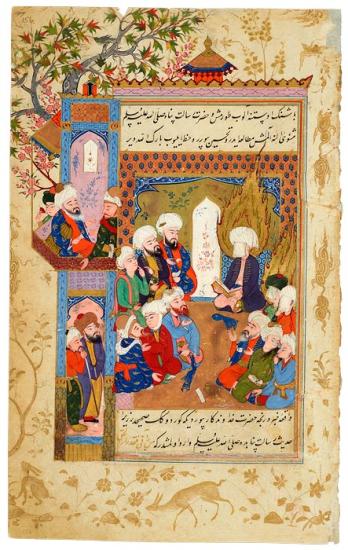
ḤusĀm Al-Dīn Chelebi, in a Dream, Sees the Prophet MuḤammad Reading Rūmī's Masnavī
Tarjuma-i Thawāqib-i manāqib (A Translation of Stars of the Legend), in Turkish
The translation was ordered in 1590 by Sultan Murād III (r. 1574–95) from the Persian abridgement of Aflākī.
Purchased by Pierpont Morgan, 1911
According to Aflākī's biography, Ḥusām Chelebi (d. 1284), Rūmī's beloved successor, dreamed that he not only saw Muḥammad holding and reading from Rūmī's Masnavī, but the prophet also praised the author. Jami, a fifteenth-century poet, went so far as to write that Rūmī's spiritual couplets are the Qur˒an in the Persian tongue. Here, Muḥammad, with a flaming halo and a veil over his face, reads to a group of men, including the young Ḥasan and Ḥusain, sons of ˓Alī and Fāṭima, Muḥammad's daughter. An old man with a Mevlevī turban (Rūmī?) and a young man holding a rose (Ḥusām, Rūmī's beloved disciple?) are seated on the balcony.
This miniature is part of a sixteenth-century manuscript account of the life and miracles of the Persian poet and mystic known as Rūmī. It is a Turkish translation of an abridged version of the original fourteenth-century Persian account by the dervish known as Aflākī.
Rūmī, Persian Mystic And Poet
The sixteenth-century miniatures presented here concern the life and miracles of Jalāl al-Dīn Rūmī, called Mē vlāna (Our Master), the most famous member of the Mevlevī order and Persia's greatest Sufi mystic and poet. He was born in Balkh in 1207, but his family emigrated after his father foresaw the Mongol conquest. They eventually resettled in Konya, Turkey, then the capital of Anatolian Rūm (thus Rūmī), where the poet died on 17 December 1273.
Several Persian accounts of Rūmī's life have been written, the first by his son, Sultan Walad. The third, laden with moralizing miracle stories, was ordered by Rūmī's grandson Ulu ˓Ārif Chelebi. It was written by the dervish Shams al-Dīn Aḥmad, called Aflākī (d. 1360). Aflākī also incorporated verses from Rūmī's works, notably his six-volume Masnavī (a poetical form of rhyming couplets) and the Dīvān-i-Shams al-Dīn Tabrīzī, named after Shams of Tabriz, the mystic who changed Rūmī's life and transformed him into a poet when they met in 1244.
In 1590—three and a half centuries after Aflākī wrote his life of Rūmī—the Ottoman sultan Mūrad III ordered a Turkish translation of a 1540 abridged version of Aflākī's text entitled Tarjuma-i Thawāqib-i manāqib (Stars of the Legend). The translator was Darvīsh Mahmud Mesnevī Khān of Konya. Two illustrated copies of the Murād translation, both made in Baghdad, survive. One, dated 1599, is held by Topkapi Palace, Istanbul, and has twenty-two miniatures. The other, richer manuscript is held by the Morgan. It dates to the 1590s and includes twenty-nine miniatures. They are all featured here, along with two folios from other collections that are believed to have once been part of the Morgan manuscript.
A Samac During the Leadership of Rumi's Successor
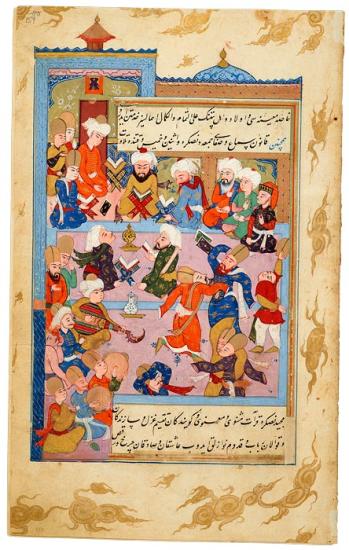
A Samāc During the Leadership of Rūmī's Successor, Ḥusām Al-Dīn Chelebi
Tarjuma-i Thawāqib-i manāqib (A Translation of Stars of the Legend), in Turkish
The translation was ordered in 1590 by Sultan Murād III (r. 1574–95) from the Persian abridgement of Aflākī.
Purchased by Pierpont Morgan, 1911
Although the accompanying text describes the successful leadership of Ḥusām Chelebi (d. 1284), Rūmī's successor, he is not singled out in this image. Rather, the painting seems to depict the various activities taking place in the Mevlevī madrasa: at the top are meditation and theological studies, while at the bottom a samā˓, a mystical ceremony where musical instruments are played and dervishes are whirling, takes place.
This miniature is part of a sixteenth-century manuscript account of the life and miracles of the Persian poet and mystic known as Rūmī. It is a Turkish translation of an abridged version of the original fourteenth-century Persian account by the dervish known as Aflākī.
Rūmī, Persian Mystic And Poet
The sixteenth-century miniatures presented here concern the life and miracles of Jalāl al-Dīn Rūmī, called Mē vlāna (Our Master), the most famous member of the Mevlevī order and Persia's greatest Sufi mystic and poet. He was born in Balkh in 1207, but his family emigrated after his father foresaw the Mongol conquest. They eventually resettled in Konya, Turkey, then the capital of Anatolian Rūm (thus Rūmī), where the poet died on 17 December 1273.
Several Persian accounts of Rūmī's life have been written, the first by his son, Sultan Walad. The third, laden with moralizing miracle stories, was ordered by Rūmī's grandson Ulu ˓Ārif Chelebi. It was written by the dervish Shams al-Dīn Aḥmad, called Aflākī (d. 1360). Aflākī also incorporated verses from Rūmī's works, notably his six-volume Masnavī (a poetical form of rhyming couplets) and the Dīvān-i-Shams al-Dīn Tabrīzī, named after Shams of Tabriz, the mystic who changed Rūmī's life and transformed him into a poet when they met in 1244.
In 1590—three and a half centuries after Aflākī wrote his life of Rūmī—the Ottoman sultan Mūrad III ordered a Turkish translation of a 1540 abridged version of Aflākī's text entitled Tarjuma-i Thawāqib-i manāqib (Stars of the Legend). The translator was Darvīsh Mahmud Mesnevī Khān of Konya. Two illustrated copies of the Murād translation, both made in Baghdad, survive. One, dated 1599, is held by Topkapi Palace, Istanbul, and has twenty-two miniatures. The other, richer manuscript is held by the Morgan. It dates to the 1590s and includes twenty-nine miniatures. They are all featured here, along with two folios from other collections that are believed to have once been part of the Morgan manuscript.
A Confrontation of Akhi Mustafa
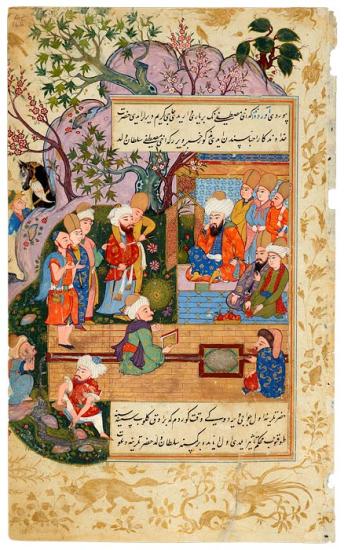
A Confrontation of Akhī Mustafā, a Childhood Friend of Rūmī's Family, and Cārif, Rūmī's Grandson and Head of the Mevlevī Order
Tarjuma-i Thawāqib-i manāqib (A Translation of Stars of the Legend), in Turkish
The translation was ordered in 1590 by Sultan Murād III (r. 1574–95) from the Persian abridgement of Aflākī.
Purchased by Pierpont Morgan, 1911
The confrontation takes place in a garden. ˓Ārif, the legitimate Sufi leader, is seated, and behind him are several young dervishes. Akhī Mustafā and his group approach from the left, when an arrow, though no bowman is present, mysteriously penetrates his heart, as one of the dervishes had imagined. (In the picture it appears that a young dervish is pushing the arrow into Akhī's chest.) A few days later Akhī was killed. The story offers a warning against denying God and his messengers.
This miniature is part of a sixteenth-century manuscript account of the life and miracles of the Persian poet and mystic known as Rūmī. It is a Turkish translation of an abridged version of the original fourteenth-century Persian account by the dervish known as Aflākī.
Rūmī, Persian Mystic And Poet
The sixteenth-century miniatures presented here concern the life and miracles of Jalāl al-Dīn Rūmī, called Mē vlāna (Our Master), the most famous member of the Mevlevī order and Persia's greatest Sufi mystic and poet. He was born in Balkh in 1207, but his family emigrated after his father foresaw the Mongol conquest. They eventually resettled in Konya, Turkey, then the capital of Anatolian Rūm (thus Rūmī), where the poet died on 17 December 1273.
Several Persian accounts of Rūmī's life have been written, the first by his son, Sultan Walad. The third, laden with moralizing miracle stories, was ordered by Rūmī's grandson Ulu ˓Ārif Chelebi. It was written by the dervish Shams al-Dīn Aḥmad, called Aflākī (d. 1360). Aflākī also incorporated verses from Rūmī's works, notably his six-volume Masnavī (a poetical form of rhyming couplets) and the Dīvān-i-Shams al-Dīn Tabrīzī, named after Shams of Tabriz, the mystic who changed Rūmī's life and transformed him into a poet when they met in 1244.
In 1590—three and a half centuries after Aflākī wrote his life of Rūmī—the Ottoman sultan Mūrad III ordered a Turkish translation of a 1540 abridged version of Aflākī's text entitled Tarjuma-i Thawāqib-i manāqib (Stars of the Legend). The translator was Darvīsh Mahmud Mesnevī Khān of Konya. Two illustrated copies of the Murād translation, both made in Baghdad, survive. One, dated 1599, is held by Topkapi Palace, Istanbul, and has twenty-two miniatures. The other, richer manuscript is held by the Morgan. It dates to the 1590s and includes twenty-nine miniatures. They are all featured here, along with two folios from other collections that are believed to have once been part of the Morgan manuscript.
Death of the Mongol Ruler Ghazan Khan
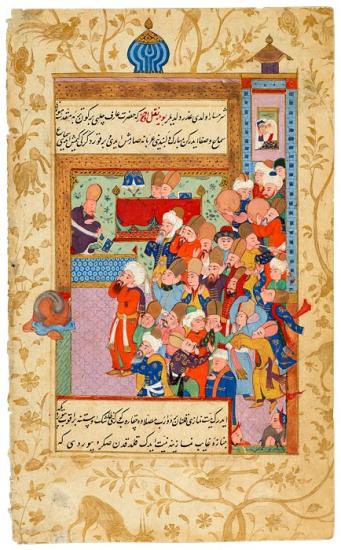
Ulu Cārif Chelebi has an Apparition of the Death of the Mongol Ruler Ghazan Khan
Tarjuma-i Thawāqib-i manāqib (A Translation of Stars of the Legend), in Turkish
The translation was ordered in 1590 by Sultan Murād III (r. 1574–95) from the Persian abridgement of Aflākī.
Purchased by Pierpont Morgan, 1911
Ulu ˓Ārif Chelebi has just left the mausoleum of his ancestors, followed by ecstatic dervishes and musicians, when he senses, from afar, the hour of death of the Mongol ruler Ghazan Khan. ˓Ārif immediately stops dancing to pray for the dead instead. (It was Ghazan Khan who ordered the Persian translation of the Manāfi˓–i ḥayavān, the Morgan's earliest and most important illustrated Islamic manuscript.) On the upper left a seated dervish near a tomb uses a meditation strap to secure his legs to his body.
This miniature is part of a sixteenth-century manuscript account of the life and miracles of the Persian poet and mystic known as Rūmī. It is a Turkish translation of an abridged version of the original fourteenth-century Persian account by the dervish known as Aflākī.
Rūmī, Persian Mystic And Poet
The sixteenth-century miniatures presented here concern the life and miracles of Jalāl al-Dīn Rūmī, called Mē vlāna (Our Master), the most famous member of the Mevlevī order and Persia's greatest Sufi mystic and poet. He was born in Balkh in 1207, but his family emigrated after his father foresaw the Mongol conquest. They eventually resettled in Konya, Turkey, then the capital of Anatolian Rūm (thus Rūmī), where the poet died on 17 December 1273.
Several Persian accounts of Rūmī's life have been written, the first by his son, Sultan Walad. The third, laden with moralizing miracle stories, was ordered by Rūmī's grandson Ulu ˓Ārif Chelebi. It was written by the dervish Shams al-Dīn Aḥmad, called Aflākī (d. 1360). Aflākī also incorporated verses from Rūmī's works, notably his six-volume Masnavī (a poetical form of rhyming couplets) and the Dīvān-i-Shams al-Dīn Tabrīzī, named after Shams of Tabriz, the mystic who changed Rūmī's life and transformed him into a poet when they met in 1244.
In 1590—three and a half centuries after Aflākī wrote his life of Rūmī—the Ottoman sultan Mūrad III ordered a Turkish translation of a 1540 abridged version of Aflākī's text entitled Tarjuma-i Thawāqib-i manāqib (Stars of the Legend). The translator was Darvīsh Mahmud Mesnevī Khān of Konya. Two illustrated copies of the Murād translation, both made in Baghdad, survive. One, dated 1599, is held by Topkapi Palace, Istanbul, and has twenty-two miniatures. The other, richer manuscript is held by the Morgan. It dates to the 1590s and includes twenty-nine miniatures. They are all featured here, along with two folios from other collections that are believed to have once been part of the Morgan manuscript.
Rumi Dancing in the Presence of Three Disciples
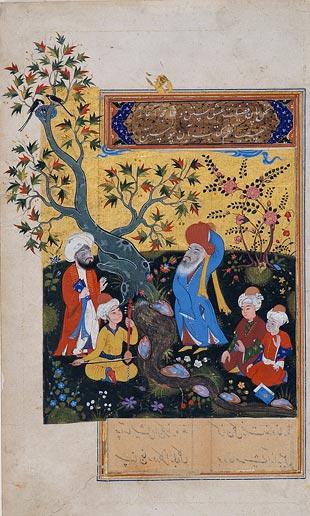
Rūmī Dacing in the Presence of Three Disciples
Tarjuma-i Thawāqib-i manāqib (A Translation of Stars of the Legend), in Turkish
The translation was ordered in 1590 by Sultan Murād III (r. 1574–95) from the Persian abridgement of Aflākī.
Courtesy of the L. A. Mayer Museum for Islamic Art, Jerusalem
To judge from offsets of pigments on text pages, as many as a dozen miniatures are missing from the Morgan manuscript of Tarjuma-i Thawāqib-i manāqib (A Translation of Stars of the Legend). This miniature, now in the collection of the L. A. Mayer Museum for Islamic Art in Jerusalem, may be one of them. Unfortunately the text at the top of the miniature has been cut away and replaced by another heading. Here Rūmī, holding prayer beads in his right hand, dances to music in the company of three seated young disciples while an older man looks on.
Rūmī, Persian Mystic And Poet
The sixteenth-century miniatures presented here concern the life and miracles of Jalāl al-Dīn Rūmī, called Mē vlāna (Our Master), the most famous member of the Mevlevī order and Persia's greatest Sufi mystic and poet. He was born in Balkh in 1207, but his family emigrated after his father foresaw the Mongol conquest. They eventually resettled in Konya, Turkey, then the capital of Anatolian Rūm (thus Rūmī), where the poet died on 17 December 1273.
Several Persian accounts of Rūmī's life have been written, the first by his son, Sultan Walad. The third, laden with moralizing miracle stories, was ordered by Rūmī's grandson Ulu ˓Ārif Chelebi. It was written by the dervish Shams al-Dīn Aḥmad, called Aflākī (d. 1360). Aflākī also incorporated verses from Rūmī's works, notably his six-volume Masnavī (a poetical form of rhyming couplets) and the Dīvān-i-Shams al-Dīn Tabrīzī, named after Shams of Tabriz, the mystic who changed Rūmī's life and transformed him into a poet when they met in 1244.
In 1590—three and a half centuries after Aflākī wrote his life of Rūmī—the Ottoman sultan Mūrad III ordered a Turkish translation of a 1540 abridged version of Aflākī's text entitled Tarjuma-i Thawāqib-i manāqib (Stars of the Legend). The translator was Darvīsh Mahmud Mesnevī Khān of Konya. Two illustrated copies of the Murād translation, both made in Baghdad, survive. One, dated 1599, is held by Topkapi Palace, Istanbul, and has twenty-two miniatures. The other, richer manuscript is held by the Morgan. It dates to the 1590s and includes twenty-nine miniatures. They are all featured here, along with two folios from other collections that are believed to have once been part of the Morgan manuscript.
Rumi Distributing Sweetmeats
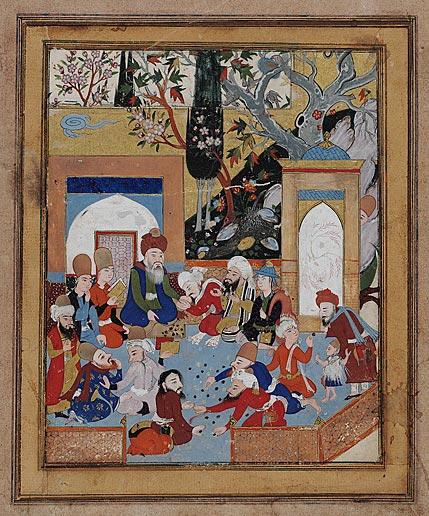
Rūmī Distributing Sweetmeats
Tarjuma-i Thawāqib-i manāqib (A Translation of Stars of the Legend), in Turkish
The translation was ordered in 1590 by Sultan Murād III (r. 1574–95) from the Persian abridgement of Aflākī.
Courtesy of the Museum of Fine Arts, Boston
This miniature, now in the collection of Boston's Museum of Fine Arts, may have once been part of Morgan manuscript of Tarjuma-i Thawāqib-i manāqib (A Translation of Stars of the Legend), though no others have rectangular frames. According to Aflākī, who wrote the original Persian text, Rūmī was given a china bowl of sweetmeats by a lady who wished him to pray for and bless her husband, who was on a pilgrimage to Mecca. Rūmī then distributed the sweetmeats to his disciples, yet the bowl miraculously remained full. He then took the bowl to the roof, returning empty-handed, explaining that he had given it to the lady's husband. When the husband returned from Mecca, his wife found the bowl in his luggage. He then said that an arm inexplicably projected itself into his tent and handed him the bowl. After realizing what happened they went to Rūmī, who said that "God had merely made use of his hand as the instrument wherewith to make manifest His power."
Rūmī, Persian Mystic And Poet
The sixteenth-century miniatures presented here concern the life and miracles of Jalāl al-Dīn Rūmī, called Mē vlāna (Our Master), the most famous member of the Mevlevī order and Persia's greatest Sufi mystic and poet. He was born in Balkh in 1207, but his family emigrated after his father foresaw the Mongol conquest. They eventually resettled in Konya, Turkey, then the capital of Anatolian Rūm (thus Rūmī), where the poet died on 17 December 1273.
Several Persian accounts of Rūmī's life have been written, the first by his son, Sultan Walad. The third, laden with moralizing miracle stories, was ordered by Rūmī's grandson Ulu ˓Ārif Chelebi. It was written by the dervish Shams al-Dīn Aḥmad, called Aflākī (d. 1360). Aflākī also incorporated verses from Rūmī's works, notably his six-volume Masnavī (a poetical form of rhyming couplets) and the Dīvān-i-Shams al-Dīn Tabrīzī, named after Shams of Tabriz, the mystic who changed Rūmī's life and transformed him into a poet when they met in 1244.
In 1590—three and a half centuries after Aflākī wrote his life of Rūmī—the Ottoman sultan Mūrad III ordered a Turkish translation of a 1540 abridged version of Aflākī's text entitled Tarjuma-i Thawāqib-i manāqib (Stars of the Legend). The translator was Darvīsh Mahmud Mesnevī Khān of Konya. Two illustrated copies of the Murād translation, both made in Baghdad, survive. One, dated 1599, is held by Topkapi Palace, Istanbul, and has twenty-two miniatures. The other, richer manuscript is held by the Morgan. It dates to the 1590s and includes twenty-nine miniatures. They are all featured here, along with two folios from other collections that are believed to have once been part of the Morgan manuscript.